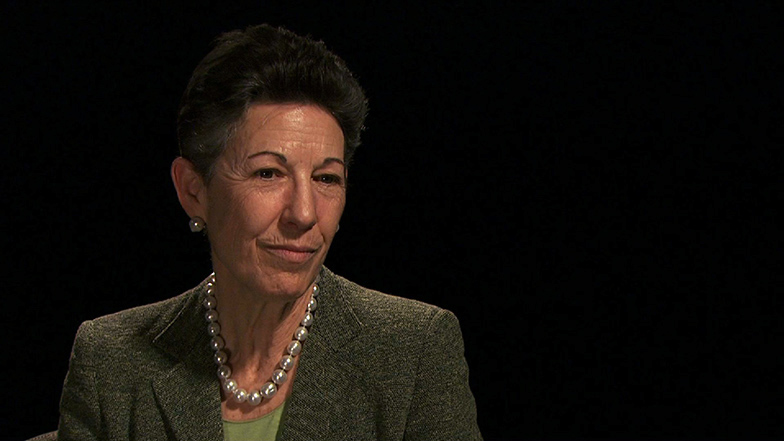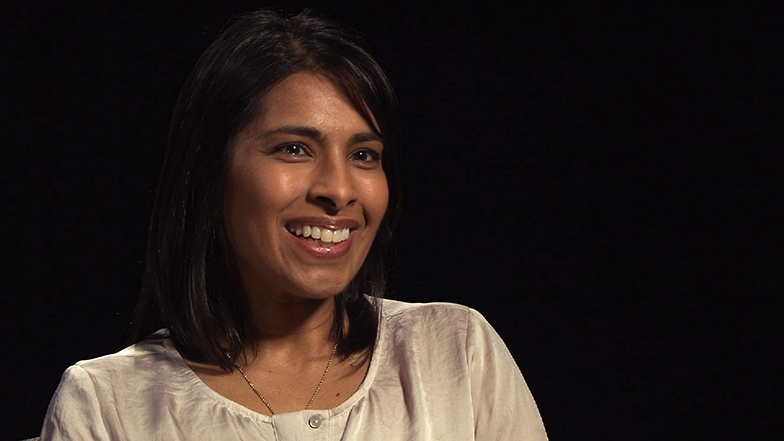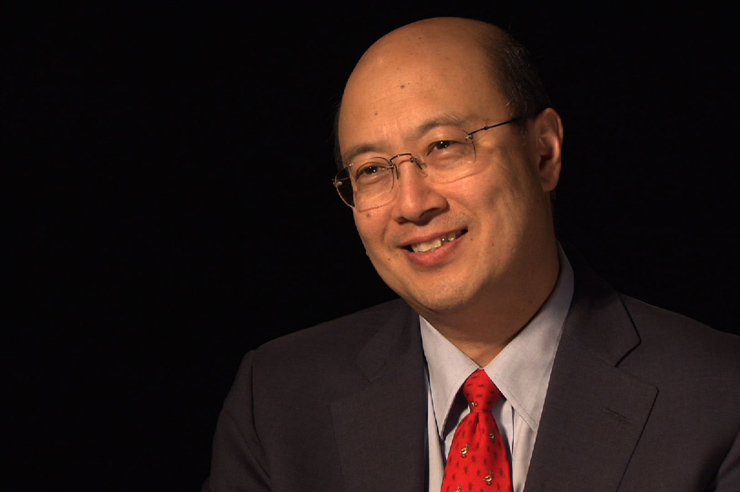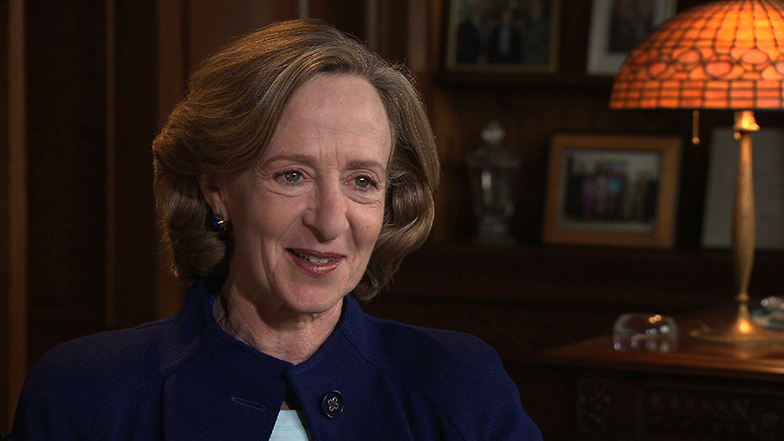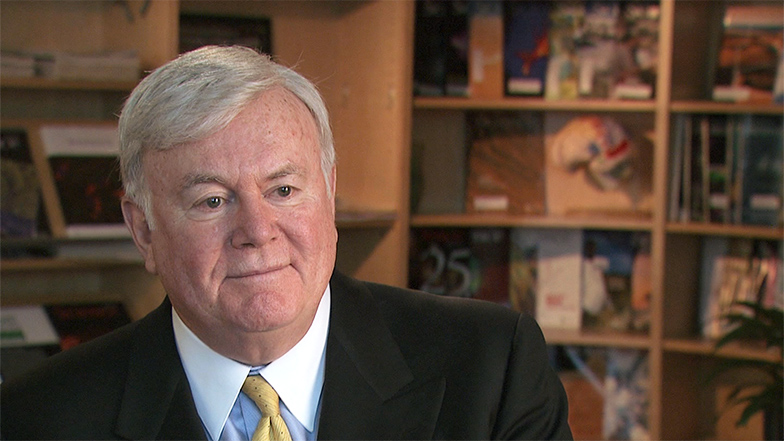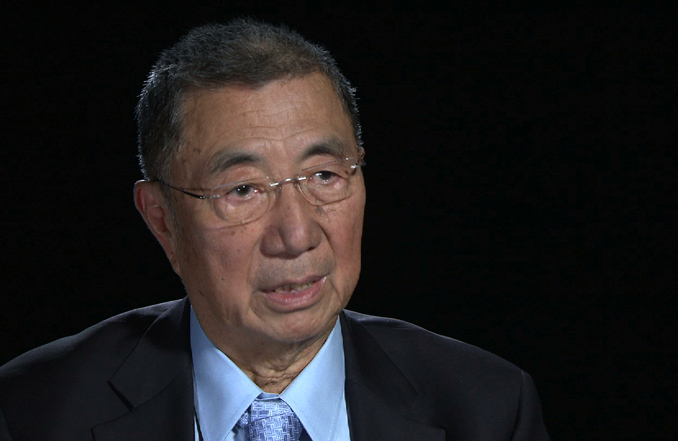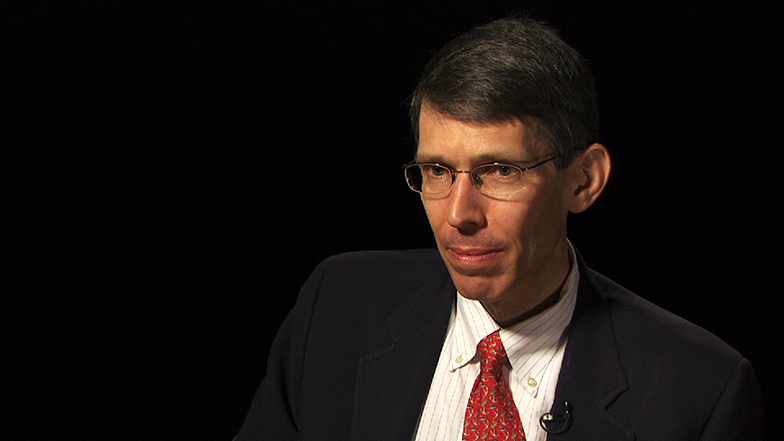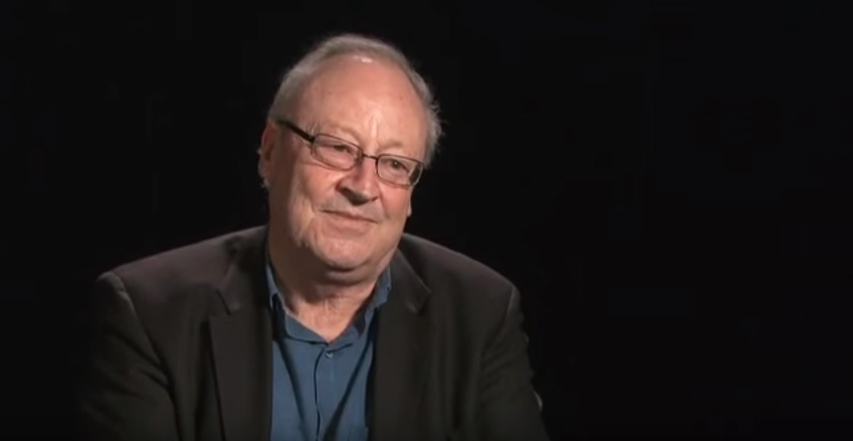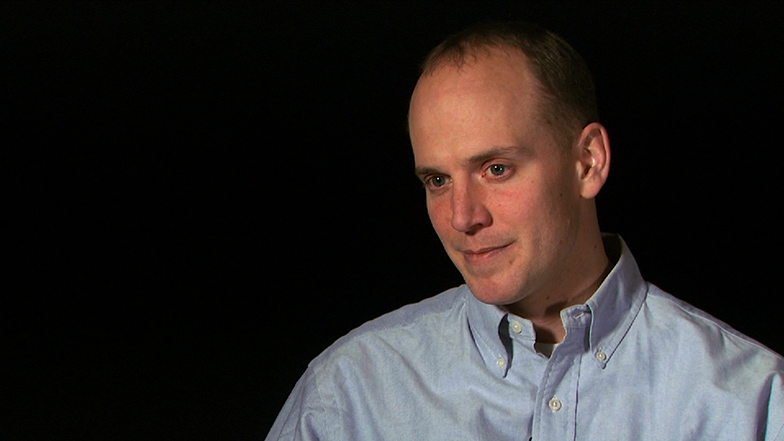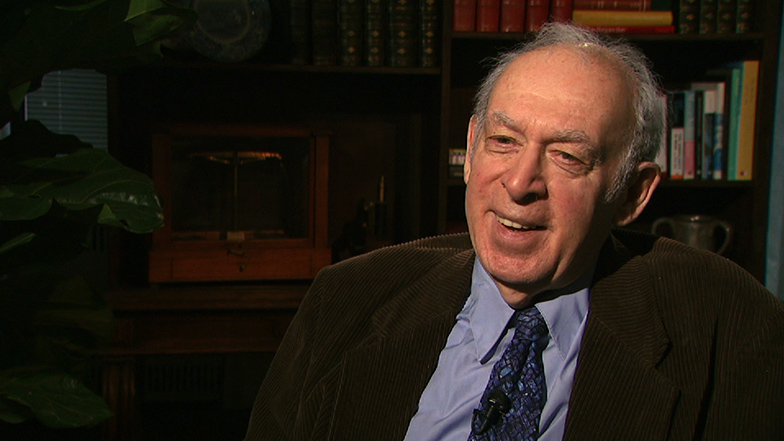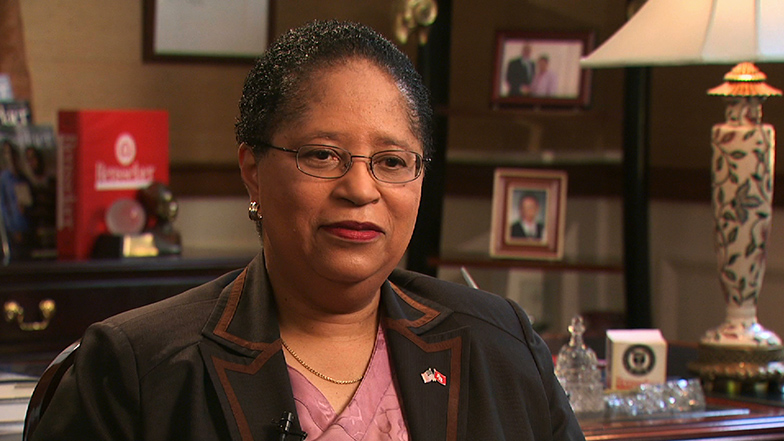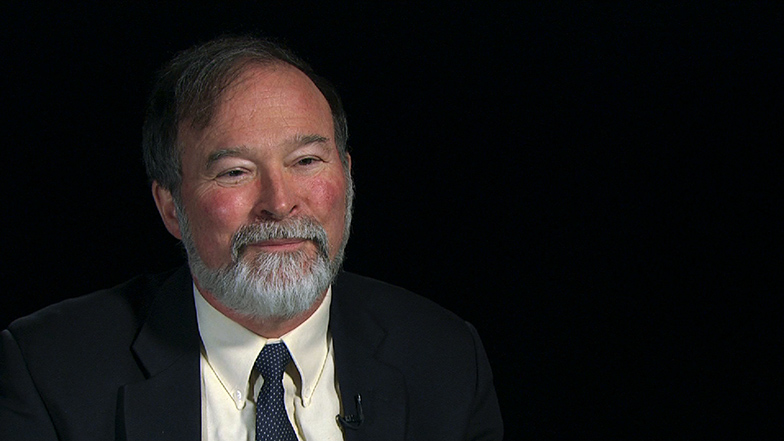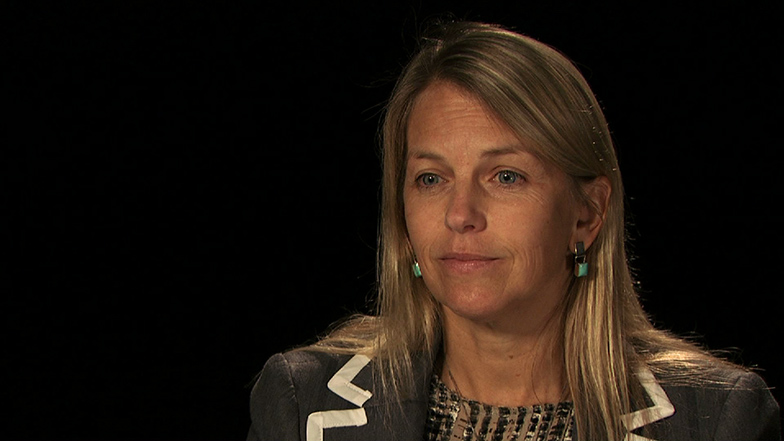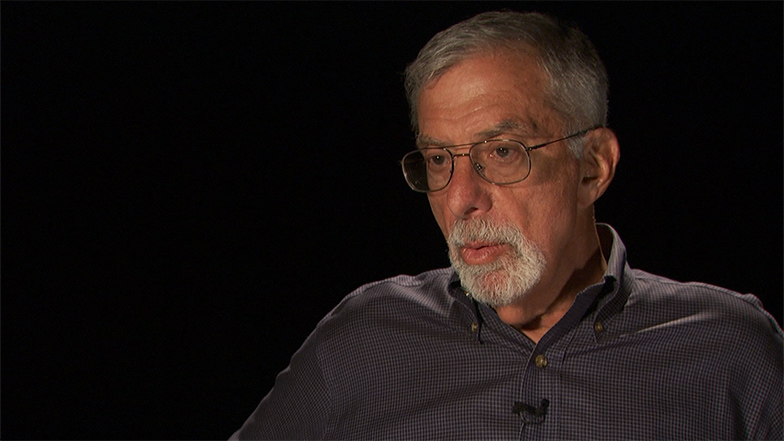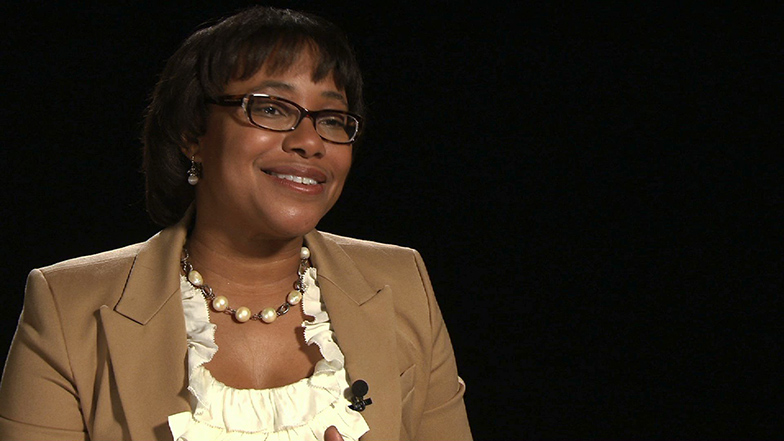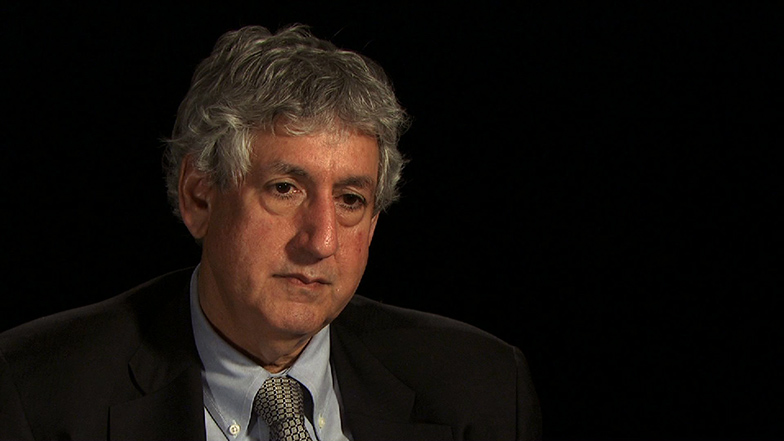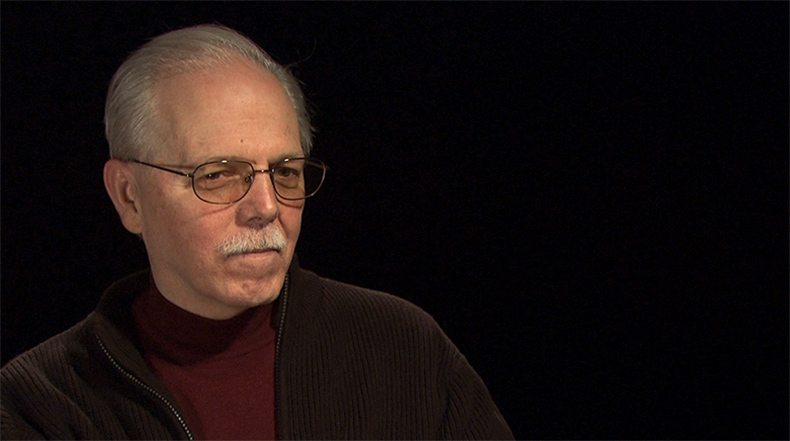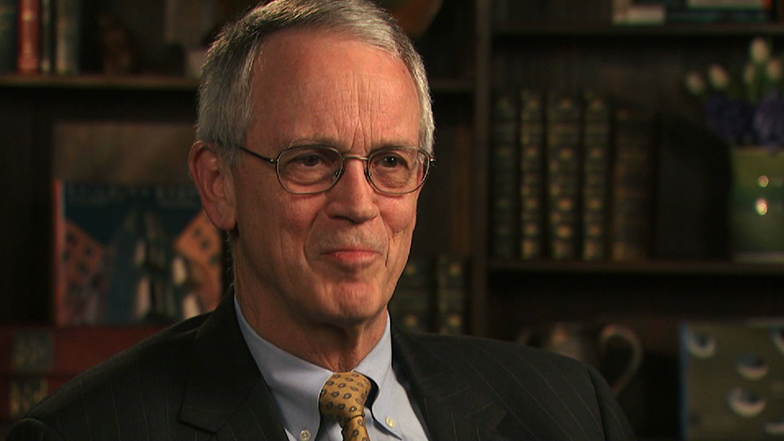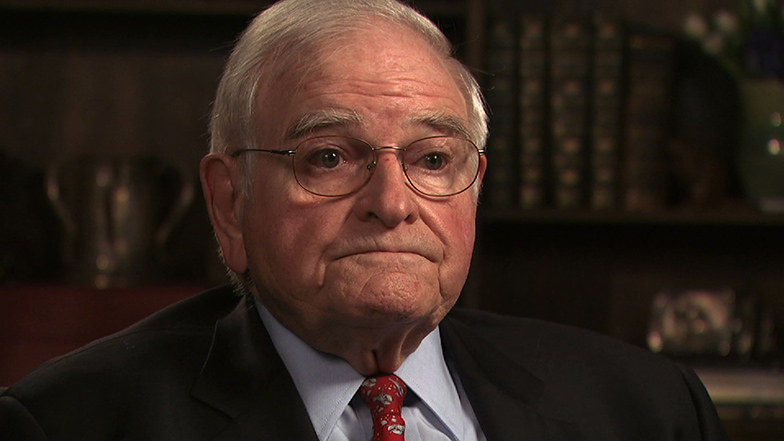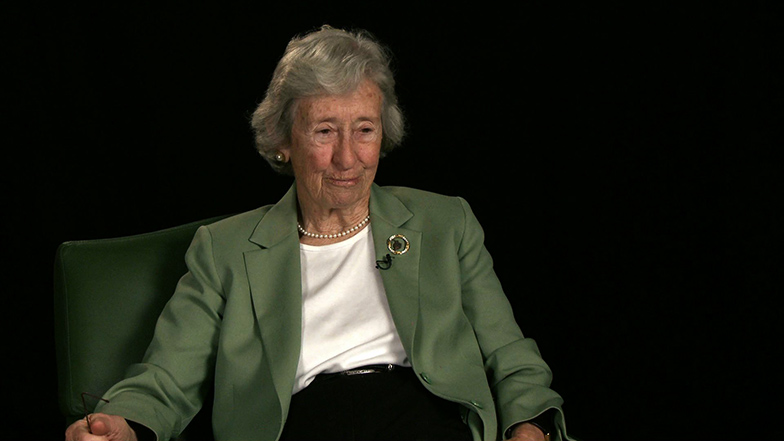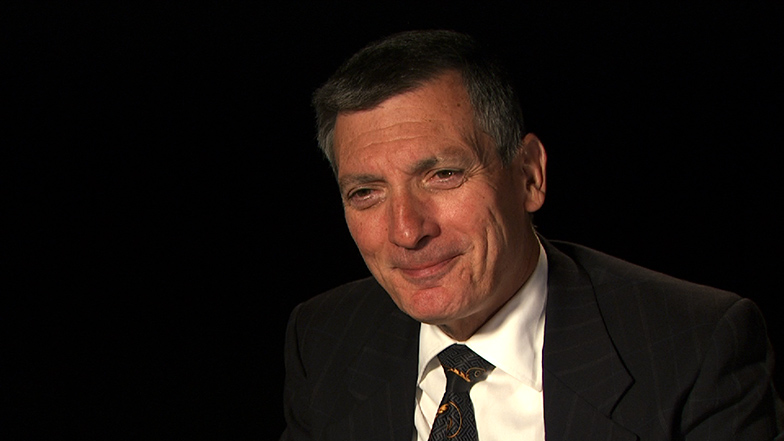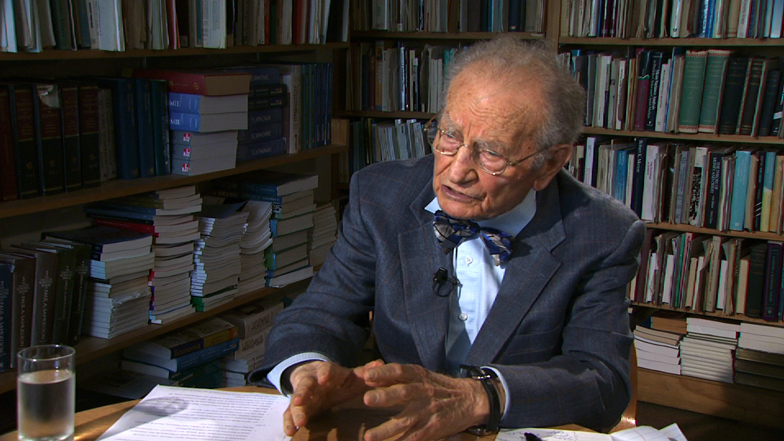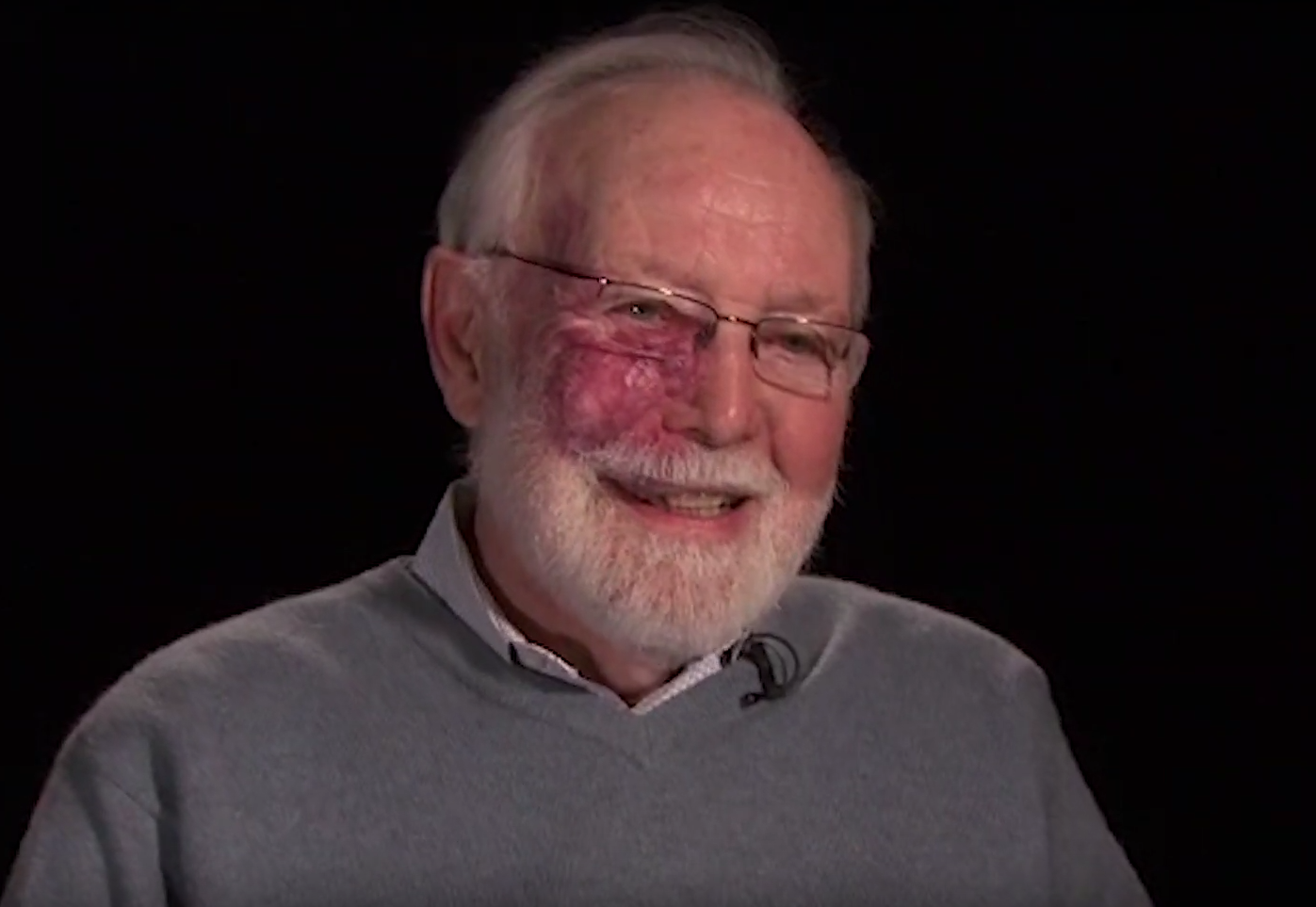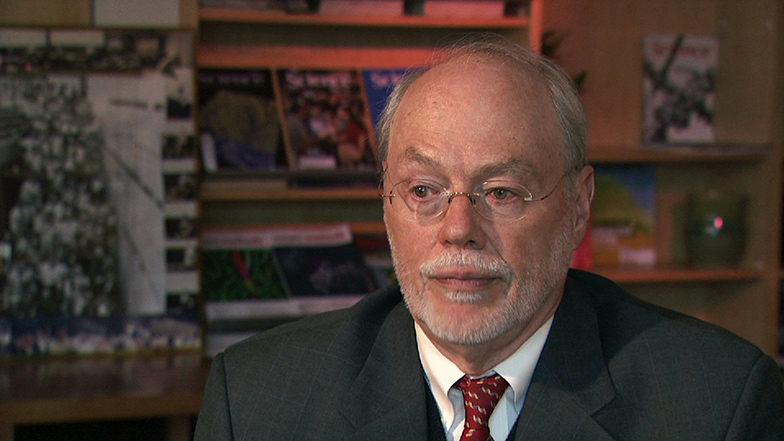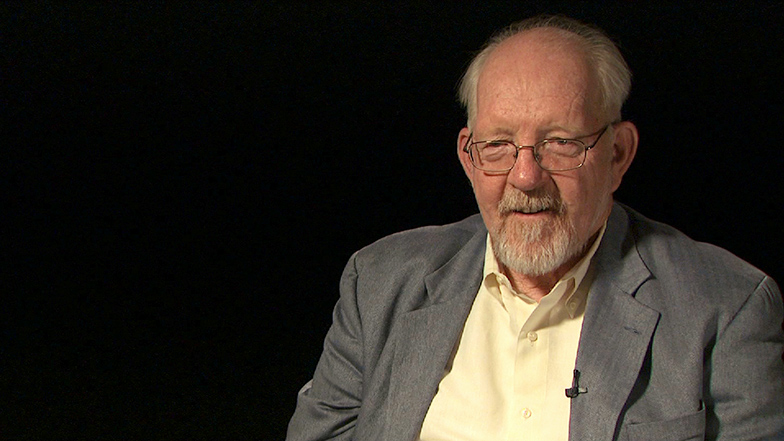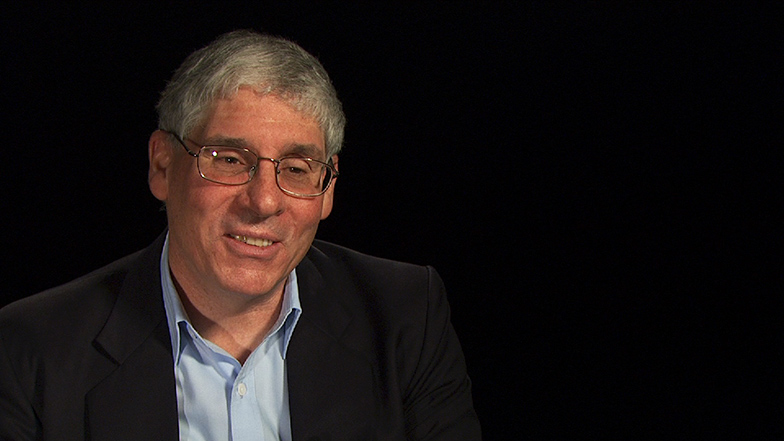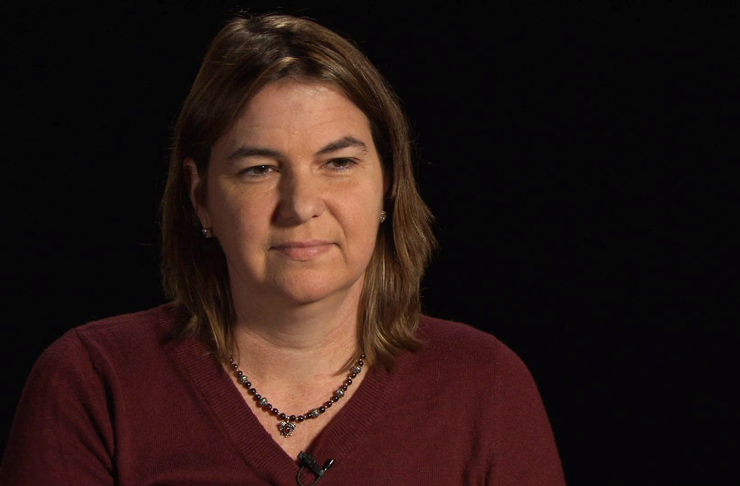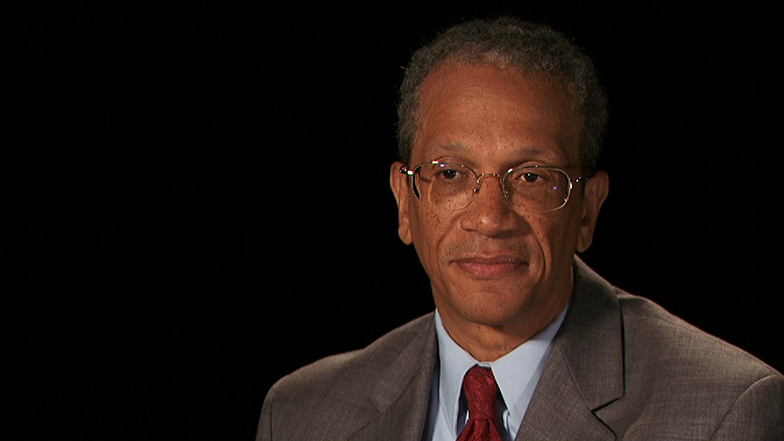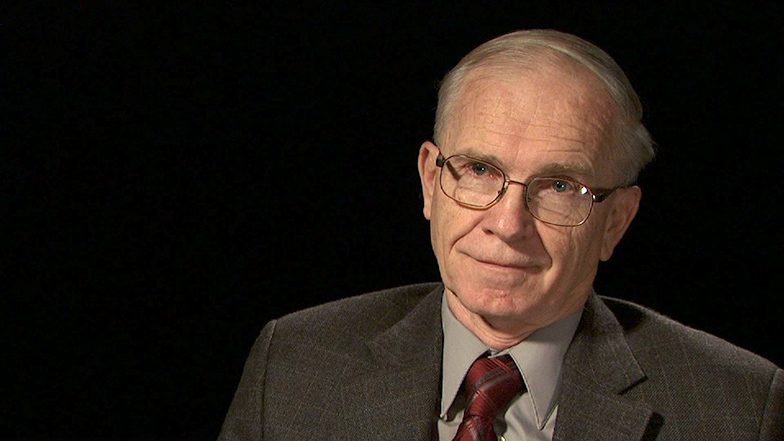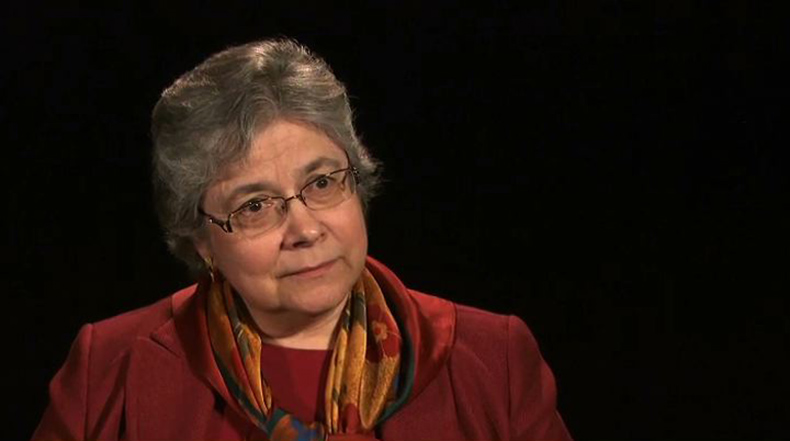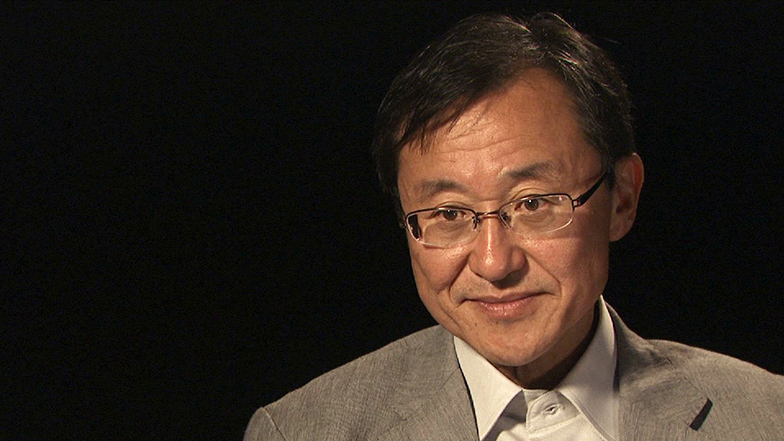Thomas L. Magnanti
INTERVIEWER: Today's April 6, 2010. As part of MIT's sesquicentennial Infinite History project, we are talking with professor Thomas Magnanti.
Tom is one of 14 Institute Professors at MIT and former dean of MIT's School of Engineering. He has devoted much of his professional career to education that combines engineering and management. And to teaching and research, and applied and theoretical aspects of large scale optimization. As dean, Tom focused on educational innovation, industrial and international partnerships, technology-based entrepreneurship, and diversity in innovation in emerging domains such as bioengineering, tiny technologies, information engineering, and engineering systems.
Professor Magnanti has led several centers and programs at MIT, including as the founding co-director, MIT's Leaders for Manufacturing, and System Design and Management Programs, and as founding director, the Singapore- MIT Alliance for Research and Technology.
He has served as president of three major professional societies, and editor of operations research. He also headed one-third of the Sloan School of Management for several years. Professor Magnanti has received numerous educational and research awards and honorary degrees and has served on a number of corporate and university boards. He is a member of the US National Academy of Engineering and the American Academy of Arts and Sciences. He has an undergraduate degree in chemical engineering from Syracuse University, and master's degrees in statistics and mathematics, as well as a PhD in operations research all from Stanford University.
Professor Magnanti is currently serving as president of the Singapore University of Technology and Design, a role he assumed in October of 2009.
Tom, thank you very much for taking the time to talk with us today.
MAGNANTI: My pleasure, Larry.
INTERVIEWER: So, Tom, can you please start by telling us a bit about where you grew up?
MAGNANTI: I grew up in upstate New York, Syracuse, New York in sort of a middle class neighborhood, middle class family. Spent much of my youth enjoying sports, playing baseball. I used to play baseball from about 8:00 in the morning -- I'd get up, I'd be the only kid in my neighborhood up and I'd just throw the ball up in the air and catch it. I would play through dinner. Come home, have a couple sandwiches, collapse and start the day over again. That was my youth -- my misguided youth, as they say.
INTERVIEWER: Could you tell us a little bit about your family and any significant events or influences that stand out from your childhood?
MAGNANTI: Well, probably the most significant influence was my father was an applied mathematician. He had these math books that I would look at when I was a kid. He would also pose math problems for me. So we'd be driving in the car, whatever, and he'd pose math problems. I guess I took a liking to them and really enjoyed them. I actually was talking to my wife last night and she asked me what I wanted to be when I was 20. I said I've always wanted to be a professor, even at age 20. She said no, you couldn't possibly. I said yeah, that's what I wanted to be. I think it was from reading those books and that interaction with my father.
INTERVIEWER: That's great.
MAGNANTI: He was a math major at Syracuse University and then went to University of Minnesota where he was a graduate student. Then unfortunately, his mother died and we all swiftly moved back to Syracuse, so he never actually finished his graduate studies.
INTERVIEWER: Did he teach?
MAGNANTI: He did a little bit of teaching, but most of his time he worked for a company called Solvay Process, later became part of the Allied Chemical Corporation. He did mostly the cost estimation type of activities. There's something called critical path method, and he brought that critical path method to bear on the company. But he had a photographic memory. He just remembered numbers all the time. He also, after World War II, when he came back after World War II, made his living for six months playing gin rummy. I think it's reputed that I took my first steps in the back room of a pool hall where people were gambling. He learned to play gin rummy from someone in the Air Force who I think was the Florida State champ. By the end of his time in the Air Force he could beat the fellow regularly. Finally after six months, no one in Syracuse, New York would play him anymore because he was winning all the time, so he had to get a real job.
INTERVIEWER: Do you think that that came from a combination of his photographic memory and his mathematical skills?
MAGNANTI: Yeah, exactly. I think he brought the two together, yeah. He would say that he almost never came across a gin rummy hand that he hadn't seen in some ways before.
INTERVIEWER: He could have taken that to Las Vegas.
MAGNANTI: Once, when I was an undergraduate student at Syracuse University, I had started playing gin rummy and bridge for money and things and I was doing pretty well. So I thought I'll challenge the old man, right. So I came back home and said I'm ready for the challenge. Of course, he whipped me, right, it wasn't even close.
INTERVIEWER: So, as a young boy did you have any challenges balancing this love of sports and the love of mathematics and what it took--?
MAGNANTI: No, nothing particularly. I was fortunate that studies came easy to me. So I can't say I spent all that much time on my studies, spent most of it on sports, actually.
INTERVIEWER: Was there an ah-ha moment when you realized you had a special aptitude in the sciences?
MAGNANTI: No. No, Ah-ha moment. I think I had always had been pretty good at math type of thing. I did have an English teacher who used to berate me because I would spend all my time on my math stuff and she didn't think I was taking English seriously enough.
I had some very good teachers, and I had one particularly good chemistry teacher in high school, and I would say that he had some influence on me in terms of just people who were really great in the classroom teaching.
INTERVIEWER: So, was that when you first developed or got interested in science and engineering?
MAGNANTI: No, I think it actually came from looking in my father's books and just sort of reading them and sort of getting intrigued by the puzzles that he would pose to me. Then I decided to go to an undergraduate school in chemical engineering. It was a very small department, only 12 of us.
INTERVIEWER: How did you decide on chemical engineering?
MAGNANTI: Well, my father, again, worked for a chemical company, so all of his friends chemies. He was an applied mathematician, all his friends were chemies. I said what do I know, I was a chem kid, so I'll go study chemical engineering. I was in a very small department, only 12 of us graduated that year in our department. I think I had maybe the number three grade point average from the university, which was pretty unheard of for someone in engineering. But the number one was one of the other 12. I wasn't even the best of the 12 in the chemical engineering graduating class.
INTERVIEWER: So when was it apparent to you that you were going to be going to Syracuse?
MAGNANTI: Well, I actually commuted. I think it was just growing up, that was sort of the natural place to go, right. Coming from this middle class family, we didn't have lots of resources, it was the local university. My father had gone there. He graduated from Syracuse University as well. So I don't think it was much of a conscious decision. I think I may have had an offer from Cornell, but I was going to stay pretty local. I would say in those days people didn't travel quite as much as they do today, in terms of thinking about going any place in the country to school. At least from my neighborhood people didn't travel, that's for sure.
INTERVIEWER: But then your horizons broadened significantly when you ended up at Stanford for your Master's degree. Can you tell us how that came about?
MAGNANTI: I can't say that chemical engineering ever excited me all that much. I sort of liked some of math sides of it, but the chemistry part didn't send me all that much. I think I might have been a junior at Syracuse, one of my professors gave me, it was a reading course, a book to read and it was on something called linear programming, which is sort of the core area of operations research. This was great because I didn't have to do anything in a laboratory. I could just think about mathematics and use it. It seemed to be interesting problems the people were addressing. So I decided well maybe that's it for me.
So then when I applied to graduate school, I applied to one ChemE department, University of Delaware, which had a group that did quite a bit of math type stuff for ChemE. I applied to a couple of operations research departments. When the fellow at Stanford who was actually in chemical engineering who is well-known for applying these kind of methodologies in chemical engineering fields, I thought well maybe I'll go there and end up studying with him. It turns out I went there and there's a fellow named George Dantzig, who is sort of viewed as probably the greatest operations researcher ever. The father of linear programming. National Medal of Science, National Medal of Technology winner. That caliber of person. He was moving from Berkeley to Stanford. He came I think the year before I did. So I had an opportunity go and work with the very best.
INTERVIEWER: Did you know when you were going out to Stanford that you were going to be pursuing a PhD in operations research?
MAGNANTI: Yes.
INTERVIEWER: Oh, you did. So that was the plan right there --
MAGNANTI: That was the plan, yes.
INTERVIEWER: So tell me, how did you come to get two master's degrees, one in mathematics and one in statistics?
MAGNANTI: Well, unlike MIT, Stanford requires no thesis for Master's degrees. If you just took enough courses and they were related to statistics they automatically gave you a degree, a Master's degree. So, the master's degree in statistics is basically a set of courses on my way to my PhD. But I really loved mathematics. So I started taking extra math courses and decided while I'm doing this, I might as well get a degree in mathematics as well. So I just sort of built up enough course credits to get a master's in math.
When I finished, I thought well this is the best life in the world. Being a graduate student and studying and learning, getting up every day and just going to learn. So I thought well maybe I should go get a second PhD, and I was thinking actually getting one in mathematics. My wife, who had been working and helping me to support me through school, said well, maybe it's time to get a job, guy. You gotta get a job.
INTERVIEWER: But you knew from a young age you wanted to be a professor.
MAGNANTI: That's correct, yes.
INTERVIEWER: So then you pursued that plan and you earned a PhD in operations research. Then what were the next steps after that? With your wife's encouragement you went out looking for a job.
MAGNANTI: Well, I didn't go looking. There were people coming to Stanford to interview. Actually a faculty member here by the name of Jerry Shapiro who was sort of the senior OR -- he and John Little were the senior OR people at MIT. He was out there interviewing, and the Stanford faculty were kind enough to say you should really talk to this guy Magnanti. So he came and talked to me. I said, well, I'm really thinking of maybe of doing a postdoc and I really wanted to go to IBM for a postdoc. My thesis advisor, I think there was only one postdoc in this field at the time at IBM. He was trying to work the system at IBM to give me this postdoc. Then I had another fellow at University of Wisconsin who was on me for a postdoc. He would call at 11:00 p.m. every night to talk to me, right, because he's really anxious for me to come. And I really wanted to one of these postdocs.
So, I mean this is unimaginable now. So I wasn't interviewing for any jobs at all, but this fellow from MIT had come and he said come on back East and spend a couple days with this interview. So I come back and I interview and basically that night over drinks, he basically said we're going to offer you a job. Again, unheard of, you'd just never do that today.
So I went back to Stanford and I really wanted one of these postdocs, so I was talking to the head of the department at that time. And he said to me are you crazy? He says MIT is offering you a full-time position to go into faculty, and you want to go off to one of these postdocs. So I guess I thought about this for a while, and I got the job.
INTERVIEWER: I'm surprised Stanford didn't make a counter offer. Were they looking to keep you there?
MAGNANTI: No, I actually don't think Stanford was looking that year. Cornell was looking, MIT -- two or three places. As I said, I just sort of stumbled into this job.
INTERVIEWER: Now what were your impressions of -- growing up in Syracuse, was MIT on the radar screen, or what were your thoughts about it in upstate New York?
MAGNANTI: That's a good question. I don't think I had this particular strong image of MIT at the time. I knew the OR field from my studies, and MIT at that time, and still to this time, had an interdepartmental OR program had decided to try it on resources from around the Institute but had no department. I was more inclined for departments. So it's quite possible if Cornell had made me an offer, I might have gone to the Cornell department.
So I was really focused on OR I would say, not necessarily on engineering per se. Of course, when I came to MIT, I came to the Sloan school. So this is sort of an odd thing as well. My thesis at Stanford was in a very, very abstract area of mathematics, something called matroids, which was just math for math psych. Had no application. And here was a management school hiring someone. One of the faculty colleagues used to call me Mr. Matroids when I came to the faculty. Again, these days it would be very difficult I think for someone to join any business school with such a background. So, it was a very different time.
INTERVIEWER: MIT has your department head at Stanford to thank for you coming here.
MAGNANTI: In some measure, yes.
INTERVIEWER: Yes, in some measure in terms of that advice.
MAGNANTI: In terms of it was remarkably sage advice, that's for sure.
INTERVIEWER: So what were your first impressions coming to MIT -- the students, the culture, the environment?
MAGNANTI: Well, one of my first early impressions was I was here, I think my family had not arrived yet. It was about 11 o'clock on an evening night and I was walking down Mass Ave. I had just come from Stanford. First of all, I was from Syracuse, New York, a rather small city, and then gone to Stanford, the farm, which is pretty quiet at night. Here I was 11 o'clock at night with cars bustling and people walking around. I said, boy, this is a really different environment. So, it was really a different environment in that sense. It was pretty exciting. I mean I think it always is for young people.
So I go into the classroom and have a sense that everyone in there's going to be a genius, right, and here I'm going to be standing in front of all these geniuses, what am I going to do? So, MIT could be pretty inhibiting, I think, at that time. These were the days when people had slide rules, very limited computing power, so it was a very different time in that sense. But it was extraordinarily to come to the place.
INTERVIEWER: Then in terms of the culture, in terms of what you had been accustomed to at Stanford and now you're interacting with students. You didn't come here as a student, but you came here as a faculty member. What did you think in terms of whatever stereotypes you had in advance, or whatever preconceived notions you had about MIT?
MAGNANTI: What I've always said is one of the big transitions that students make is that you go to the other side of the desk. So instead of sitting in front of the professor, you're on the other side of the desk.
My first year here was very quiet. I just recall sort of sitting in my office doing my work, no one bothered me, I didn't bother anybody. But also I've always viewed MIT as a very, very friendly place, but not necessarily a very social place. I think it's gotten more social over the years. But sort of people left you alone, let you do your work. I was I think the only junior faculty member hired that year.
INTERVIEWER: You were also very young.
MAGNANTI: Yeah, I was quite young, yeah. So I just sat in my office, did my work, taught my courses, probably didn't interact with much of anybody. Then it was my second year where I started I think get a little more rhythm of interacting with the community more. In those early years, I spent a lot, a lot of time with the students, a lot of time with them, which was about as much fun as you can imagine. Of course, my first student was -- first of all, some of the students were older than I was, and many of them looked older than I was. I actually looked very young at that time. I had these early pictures of me, my hair down to my shoulders. It was this hippie coming from the West Coast to join the faculty. My first graduate student ever was Gabriel Bitran, who later became deputy dean of the Sloan school, a very prominent academic academician himself. I think he's about three or four months older than I am, a few months older than I am. So, I was very, very young looking, interacting with people that were basically the graduate students my age, many of them a little bit older. So, you have sort of bit of different interactions with folks at that point in your life.
INTERVIEWER: What was the balance like between teaching and deciding to do your research and thinking toward publishing? What was that like early on?
MAGNANTI: One is we did more teaching back then. I recall it was my second year at MIT, taught four courses, which is pretty significant by MIT standards, certainly these days. I had a lot of time for research, an awful lot of time for research. Of course, this was also a time of great personal growth. So I had a young family, I had a young son, young wife, we were living in an apartment. I think we tend to forget, at least the old cadres such as myself now, how exhilarating it can be to be a young faculty member, and how much time the young faculty people have. They have all this enormous amount of time on their hand. So I had plenty of time to do all kinds of research, plenty of time to do my courses.
INTERVIEWER: Did you like teaching?
MAGNANTI: Yeah, very much so. I loved it, just loved it. This was a reason to come to a university, to do teaching, do research, interact with students, fellow faculty.
INTERVIEWER: Let's talk a little bit about your areas of expertise. Explain to me, if you would, a little bit about each. One, operations research. Can you talk a little bit about that field and what that's about?
MAGNANTI: Operations research was actually born at MIT. So, a very distinguished physicist by the name Phil Morris, Phillip Morris, viewed frequently as the father of operations research in the United States. This came out of efforts that he was doing during the war, Second World War where many physicists at the time, I think some chemists, were brought to Washington to help with the war effort. They were doing things like optimal deployment of radar, optimal deployment of other military resources. The title became operations research with the notion you were researching and operations -- operations is simply getting things done.
That field has several different branches. Much of it has tried to do planning, sort of bring analysis, mathematics, modeling to plan. So if you're a manufacturer, how do you plan for the flow of goods and materials through a manufacturing facility. If you're a telecommunication company, how do you design a telecommunication network, how do you route messages in a telecommunication network.
So, part of the field looks at underlying uncertainty, and so you've got variations in those operations. A field called queuing theory, how queue is developed and built up -- our dear friend Dick Larson is an expert in that field. So that's one branch. Another significant branch is optimization. So how do you develop approaches to better organize a distribution system, to better organize a procurement system, better organize a telecommunication system. That's what I fell in love with was this field with optimization. So it's developing mathematical tools, algorithms, methodologies, models for looking at various operations and how to improve them.
INTERVIEWER: Can you describe an optimization problem or challenge that impacts our daily lives? Just an example of one.
MAGNANTI: As an example. I don't know if your car has a GPS system in it. You go in your car in your GPS system and say I want to go home. You push the button from wherever you are to go home. What does it immediately do? It immediately goes through an algorithm that computes the shortest path to get you from where you are to home. So that's an algorithm. The algorithm says given the travel times and the various streets that I might go over, what's the best path for me to take through this system. So it's actually solving an optimization problem to optimizing that. So every time you press your GPS system it's doing that.
Every time you pick up your phone and make a phone call, the system has to determine what's the best way to route the message through the telecommunication system. When you click on your internet, it's doing the same thing. Those are all optimization problems or planning problems in which you're trying to use technology for best purposes in those cases. So sometimes people say operations research isn't about creating technologies, it's creating the best way to use those technologies.
INTERVIEWER: Interesting. I'm jumping ahead here with this detail, but I know that you were involved in developing systems that assisted Singapore ports. Is that a larger scale? Can you talk a little bit about the work that was done to assist with that problem?
MAGNANTI: That isn't actually work that I've done, but those types of issues are operations research issues.
So you've got all these ships coming into port. You have to take the containers off all these ships. You've got to determine what order to take the containers, where to put them, how to place them so that when you're going to remove them and move to another port, what's the best way to access them, what's the best way to move them around in the port? So you can develop procedures or methods for doing that. What's the best place to place the container? If you've got to load a container, what's the best way to load them?
A famous problem in the operations research literature is called the packing problem. So I've got a container, so think of you moving your household goods, right. You've got this limited trailer that you've rented, and you want to pack as many of your goods in as possible, so you don't have to make too many trips for this. It's an optimization problem. It's called a packing problem. So that's an example of this. So if you're just packing containers, that would be a problem in operations research.
INTERVIEWER: Now another area of expertise is management science. Can you talk a little bit about that?
MAGNANTI: Often management science is used synonymous with operations research. People view management science in various ways. But one sort of definition of management science is taking science and applying it to management. So it's applying analytic methods, mathematics, modeling, these types of things, to management. So in that sense, there's not much difference in operations research. So, operations research doesn't always apply just to management issues. It might apply to engineering issues or other issues. Then there's some folks who would say that management science is actually broader than that. That it would include information systems, not just operations research. It would include marketing.
So if you look at the Sloan school, the Sloan school's composition of management science has operations research, something called operations management, marketing, information technology, are all part of management science. Actually, when I headed up the management science group at Sloan, it also included the accounting group, so it was part of the management sciences.
INTERVIEWER: You are considered a pioneer in the field of education by your efforts to combine engineering with management. Why was this kind of change so necessary?
MAGNANTI: Well, I think historically, there was this divide between those who created the technology and those who managed the technologies. Historically, engineers and educators -- didn't talk to management educators -- and just as you find stovepiping industry you find stovepiping at universities. MIT was a little bit of an exception to that in the sense that there was more fluid boundaries between the schools. In fact, when I first came to MIT, the Sloan school was a very, very techie place. It's hard for people to really comprehend this now, but the Basic Information Technology course at the Sloan school at that time actually taught something called machine language. So this was the language for, as you well know, the underlying bit language or close to the bit language for programming computers. In my own field with operations research, it actually taught the mathematical algorithms for solving some of these planning problems.
So, it had always have been a very techie place -- of course, Sloan grew out of the engineering school here at MIT. But even then, I think historically even Sloan and engineering were quite separate at MIT. That you'd find some people that would cross the boundaries, so that early on I would say the operations research people crossed the boundaries between Sloan and engineering, and the economics faculty crossed the boundaries between Sloan and economics at MIT. So you saw these boundaries.
I think then as we try to address some important societal issues, the first one of those I was involved with, and probably today one of the most significant collaborative initiatives between Sloan and engineering and several of now management engineering schools with our Leaders for Manufacturing Program. This was born out of the crisis in the mid-'80s. In the mid-'80s, for those that remember, the US. was losing its manufacturing base. There was a sense that the Japanese had taken over manufacturing. They had adopted quality principles and just in time principles and other principles, and we were losing jobs in the United States, we were losing market share in many of our most important industries. Our balance of payments was getting out of whack. There was a general fear that the US had lost its way in terms of manufacturing.
I would say MIT to its credit, and I would credit in particular, Jerry Wilson who was the dean of engineering at that time. I think Jerry, because of his personal interest in this and his personal credential. But also I think he was being pressed by some people from the outside. And said, you know this is an important issue, the country is in some problems and troubles and you're the leading engineering school in the world, perhaps you should be doing something about this. Jerry, to his credit, stood up and said yes. We are part of the problem, that is MIT's part of the problem, engineering's part of the problem.
So he started some conversations and he actually started the conversations with Ken Bowen who at that time was a professor of material science, ceramicist at MIT. It became clear as they started talking to people that this required just not an engineering technology solution but also management solution to come to grips with it. So he started some conversations with the Sloan school in terms of this. I, at that time, was heading up about a third of the Sloan school, the so-called management science area. There was some false starts at this. They'd made a proposal to IBM and IBM chose some universities and not MIT. It was a National Science Foundation Center of Excellence, centers of engineering excellence, and we didn't win one of those. These conversations were going on and it seemed to me that this was pretty important to MIT, pretty important to the Sloan school. I think they were looking for a contact at Sloan.
So I said well, I've been doing this management science thing for a while now, why don't I joined them in this effort, so I joined them. I'd been interacting a fair amount with engineering already through the operations research center. But that started I think a more deep collaboration between the two schools. That became a bit of a model for several other universities. So several universities adapted that model and it became I think a way of bringing together the best of management education, research and thinking with engineering education and research thinking.
INTERVIEWER: You were co-founder of Leaders for Manufacturing.
MAGNANTI: That's correct. Ken Bowen and I were the co-directors as it began, yeah.
INTERVIEWER: Then you also co-founded this System Design and Management Program?
MAGNANTI: Yes.
INTERVIEWER: Did that grow out of this work? How were they connected?
MAGNANTI: No. They're clearly related. So we had developed the Leaders for Manufacturing Program and it was a remarkably exciting time. We had leaders from industry working with us. Many of the leading manufacturers in the country. So their VPs for manufacturing, sometimes engineering were working with us. Some of the second level executives were working with us. We had developed the program and we've gotten into the fourth or fifth year for the program. It struck me that it was moving along quite well. I was actually very proud of it. I'm very proud of what we've done. My own sense is every few years it's good to do something different. So I said well, it's probably best -- and I think it's also best that these programs don't become identified with a single person. I think they should become institutionalized rather than personalized. So I said it's probably best that I move on and do something else and have someone else take the reins for this program.
So, when I stepped aside there had been some interest in developing something in the systems area. I'm trying to recall now. Joe Moses was very interested in this. Somehow, I don't think I can quite recall, but somehow I'd gotten involved in this -- sort of a next thing to do. Started conversations again across the schools, and at least the initial notion was this was going to do for engineering what LFM had done for manufacturing -- of bringing engineering management, and engineering-engineering closer together in terms of the engineering, product development side of the house rather than the manufacturing side of the house.
In some sense, LFM had been thought of as big on manufacturing. It wasn't just the manufacturing shop floor, it was the whole enterprise. So we started to work on that. I was working at that point with a handful of faculty. I think Dick Schmalensee was involved, Ed Roberts was involved, Earll Murman was sort of the closest contact. I got held up one day, the Amsterdam Airport, there was a plane delay or something and I got held up for seven or eight hours there. So I recall at that time writing the original proposal for the SDM Program. This was the proposal for the System Design and Management Program, which seemed to resonate with people. Then at that time Earll Murman suggested that there's this young faculty member in our department who you might want to get involved with this, and this Ed Crowley.
So, Ed and I met and developed a relationship, and so we started as pioneering or founding co-directors of that program, the SDM Program.
INTERVIEWER: That program is still thriving.
MAGNANTI: Yes, still thriving, yes.
INTERVIEWER: In conceptualizing SDM you did a lot of field research. Can you talk about the reason for that and the ultimate value of that research?
MAGNANTI: First of all, we wanted this to meet industrial needs and to be something that was going to be valued by industry. Just like LFM we wanted to engage industry in helping to frame the curriculum from the problem with it. So we went to some of our colleges and industries and said what should we be teaching? They, to their credit, said wrong question. The question you should be asking us is what's the core knowledge that you need for these programs. Then you're the educators, you'll develop a curriculum around that core knowledge.
So we then decided to go out and to spend a fair amount of time talking to people from industry. We actually did use some tools of design -- Ed Crowley really did this. So something called house of quality and some other tools. So, Ed tried to take those tools and use them as we were getting this information from industry. We used those tools and methodology to then develop the core knowledge we wanted and then built upon that curriculum that we developed.
Those were both pretty heady programs to start. LFM we had decided, actually Jerry Wilson had decided, that we weren't going to start the program unless we got sufficient funding from industry. If we're going to do this we had to do this well. We had been going around and around with several companies -- we had some that had committed -- but hadn't yet gotten the full funding for this. It was April in the year that we started, we finally got the funding, and now we had to decide whether we were going to wait a following year, because we were starting in July, or we would start that July. We decided to go ahead and start that July. So this, mind you, without the curriculum in place, without all the faculty quite in place. So we actually took people who had already applied to either engineering or Sloan school. We said we got a deal for you. You can come to this brand new program that has no curriculum, had no department status, it's this interdisciplinary program, but you'll get a full fellowship, you get full tuition, you can a stipend from us.
INTERVIEWER: That's a great way of jump-starting.
MAGNANTI: It was a great way. So we started LFM that way. In SDM we ran a pilot year. We had a small number of students, I think it was about eight or ten students, and they actually were taking the courses as we were developing them in the first year.
So both of those programs started in sort of this let's jump in, let's learn as we do mode of developing the programs. Again, that's part of what made them pretty heady as we were starting, pretty exciting and pretty challenging as well.
INTERVIEWER: LFM has morphed into something else, correct?
MAGNANTI: Yeah, LFM now is called the Leaders for Global Operations. To me it'll always be LFM.
INTERVIEWER: You've traveled quite a bit in your time at MIT from Sloan to engineering. Can you speak about the interdisciplinary aspects of MIT?
MAGNANTI: Well, I think one of the great attributes of MIT is its fluidity. I think it very much values interdisciplinary education and research. It very much supports interdisciplinary education and research. I think those fluid boundaries are one of the things that makes this a very special place. So even before I had made any of this move to engineering, I had students through the OR Center that I had supervised in aeronautical engineering and civil engineering. Again, that was in part because of the field I was in, but in part because MIT made it easy to do that in terms of this interdisciplinary education.
The OR Center, the Operations Research Center is a rather unusual animal. It reports through the vice president in the research office. It offers its own educational programs. The degrees are actually officially offered by one of the departments because it doesn't offer degrees. But it runs its own educational programs -- it admits its own student, it runs its own exams, it offers courses through the units, so it has no courses and things. So it's a very unusual organization in the sense of having students have an educational responsibilities, but having no faculty resources, no course resources, very limited financial resources. But in a place like MIT it works. Maybe it's a little bit mysterious as to how it works or why it works, but I think in part because MIT values those interdisciplinary interactions and supports the interdisciplinary actions.
INTERVIEWER: You're a co-director of the Interdepartmental Operations Research Center.
MAGNANTI: Yes, for many years. In fact, I was co-director of LFM and the OR Center at the same time. Earlier than that I was head of the Management Science Area and I was also editor of the major journal in my field. Some of us at MIT are a little crazy.
INTERVIEWER: In addition to that you've had visiting scientist appointments at both Bell and GT Laboratories, and been involved with Digital, Saber, Ford Design and others. Can you talk about the value of these sorts of associations with industry? Also, what association should academia have with industry?
MAGNANTI: My Bell Laboratories was a summer activity, so I'd been there in a summer. I had spent a summer there actually in a research organization doing research. GT Labs was a research project that I'd been involved with them. Digital, however, and Saber were quite different. So Digital, actually in the midst of my LFM activities, I was going to take a sabbatical. I spent the first half of that sabbatical in Belgium at a research organization where I'd been earlier in my career. I decided to spend the second half at Digital Equipment, so I was in Maynard, up in the old mill. In part it was I wanted to experience industry first hand. Here I was developing these programs for industry and getting a sense of what goes on.
This fellow named Bill Hanson who was the vice president for manufacturing at Digital at that time -- he later became a co-director of the LFM Program at MIT. Great fellow. He was kind enough to let me sit in on his staff. So I would just be there as sort of a gadfly, fly on the wall, however you want to characterize it. I would attend some of his meetings, I'd have opportunity just to talk to lots of people. Just learn a little bit about what life was like in a corporation. I was also writing a book at that time, and unfortunately, because I was writing the book, I was spending probably more of my time writing a book then really learning as much as I might have at that point. But that was a very worthwhile experience.
My time at Saber was quite a bit different. This, again, was another sabbatical, and I was spending about a week a month in Dallas. They had a small research group, about 25 people, that did many of the methods and algorithms that the airlines use for things like revenue planning. So, if you're going to sell seats on an airplane, how many seats do you sell at what price, when do you release seats, all these type of things. They'd also done routing for the airplanes and scheduling for the airplanes, searching for the crews. All those kind of things that they were doing.
So I went down there, there was another fellow from Georgia Tech who was also similarly doing that. In some ways I mean it was very senior people there but there was a younger people -- it was like having a large group of graduate students in some way. So I got to interact with them. So I got to see industrial problems through that setting. But it was a small R&D group, so it was a little different than sitting in the manufacturing. But again, opened up my eyes to industry and what industry was doing. For me it's been very valuable bringing that back into the classroom and bringing that back into the programs.
The GTE one actually developed into I've had several students since then do internships there and they brought back very interesting problems that we've used for thesis and developed thesis. One student came back and had this thought of an idea of something to do and my original reaction was this is too hard, we can't do this problem, this is just too hard. He persisted and he actually wrote a thesis on it, we ended up writing several papers in that arena. So being motivated by and stimulated by industrial problems and real world problems I think is again, part of the overall gestalt of MIT in terms of its mons and manus, and bringing the world into MIT and MIT into the world.
INTERVIEWER: That was going to be my follow-up question. In terms of your own research, what do you personally think have been the most interesting discoveries that you've made?
MAGNANTI: Interesting discoveries. Well, actually I think the most important thing that I've done is I've written a couple of books, and one book in particular, a second book, has become sort of the major textbook in that area. So the fact that this is working with Jim Orlin in our faculty and another fellow from University of Florida, Ravia Hosha it's sort of become the standard textbook, graduate textbook in this arena. It in some ways synthesizes about a 30- year, 40- year literature, brings it together in a way that I think makes it comprehensive to everybody. It's pretty easily accessible. I think that book has had the most impact of anything I've done in terms of my research.
In terms of my research, I've done some various things on theory. Some just out and out theory for theory sake, which is always good fun, and hopefully of some value to something. Much of my research has been motivated by real problems. So I tend to do theory on real problems. Probably the things that might be most known or best known are some things I've done on designing networks. So if you're a telecom company or if you're a manufacturing company, you need to design a supply chain network, how do you go about designing the networks? So, for example, in telecommunications typically what you want to do is you want to send messages from point A to point B. Your a telecom company, where do you put the links in the network, how do you route over those links. If you're putting in devices such as multiplexors or concentrators, things that take messages and compress them or propagate them, where do you put those devices. So we've done quite a bit of work on developing methods for doing that.
INTERVIEWER: Now when you say "we," I mean this is work that you've done?
MAGNANTI: This is we being me and my students. My students and I. Almost all of my work has been done collaboratively with my students. I've done a few things, just a very few things with faculty colleagues, but mostly it's been with my students.
INTERVIEWER: My next question was going to be how do you feel you have changed or impacted the field, and you just answered that in part. But certainly the textbook must be something you're very proud of. How long has that been used and does it continue to be used?
MAGNANTI: Yeah, I continue to get these small royalty checks. Yeah, it continues to be used. I think it's probably now about 15- years- old, something of that order. I think what are we most proud, I often say I'm most proud of my students. You have these incredible young people that come and they work with you and then they go off and do great things for the world. Along the way, we influence them some. We hopefully help them grow both personally and professionally. We have a great time doing research with them. I seem to have, and maybe it's in my genes, I seem to populate deans type of people. I've had one of my students, Gabriel Bitran, as I mentioned before, has become deputy dean at Sloan. Jane Hammond is a senior deputy dean at Harvard Business School. I've had one who I think is still an associate dean at University of Texas. One was an associate dean at the University of Pittsburgh. I seem to grow these -- maybe it's these administrative instincts that I have or some ways, but pollute them, right?
INTERVIEWER: That is a great accomplishment. I wanted to just step back a little bit and talk about engineering systems again. In delivering the prestigious Brunel Lecture, you cited the 20 greatest engineering achievements of the 20th century. These achievements include electrification, transportation, airplanes, water supply and distribution, and electronics. How would you characterize the role of engineering systems in these achievements? And as a follow-up, how did MIT contribute to those achievements?
MAGNANTI: Well, if you look at the -- again, this is the National Academy of Engineering at the turn of the century decided to identify these 20 greatest achievements of the last century. It was a very elaborate process. Chuck Vest, our president at the time was involved in this process. The striking thing to me when I looked at that list, and this is what I discussed in this Brunel Lecture was most of them work large- scale technical systems. Electrification is a system. The highway is a system. The internet is a system. These are all very complicated technical systems. In that sense, they provide great opportunities and great challenges for MIT and other places. How do you diagnose such a system, how do you design such a system, how you manage such a system, how do you improve such a system?
Now, I wouldn't say that MIT has been involved in the systems aspect of all those, and in fact, those systems evolved over time often, I would say, in a rather ad hoc fashion. If you think of electrification, you had people like Westinghouse and Edison and other developing uses for this in the system. Over time they grew, right. You can say the same thing for the telephone system. So, Alexander Graham Bell had this idea and eventually sort of these systems grew. But they didn't grow out of any necessarily planned effort in that sense or planned activity. It was sort of organic generic growth, if you will. I think what we try to do to engineering systems, and I think what MIT and other universities are trying to do now is many of the most challenging problems that face society these days are also engineering systems. Think of the environment, energy. There's clearly technology components of this, but there's also how those technologies are deployed to manage in a system where the system has both technical challenges, as well as political and social challenges [UNINTELLIGIBLE]. That's what MIT's trying to do in this arena of engineering systems and it's developed the wherewithal for doing that.
Now I tend to view myself, as an engineering systems guy in the sense of I look at networks and look at these systems and stuff. But my own work has tended to be sort of the mathematical modeling of these where I think engineering systems more broadly that would be one component of it, but it is also how you architect those systems, how do you think about the political landscape, the social landscape and all that. So I wouldn't point to MIT contributing to the system aspects of those, though I would point to it now as trying to address those systems and trying to improve in terms of providing the wherewithall to improve them.
INTERVIEWER: As a follow-up, what do you see is the big challenges ahead in engineering and management in the 21st century, and what are the opportunities for today's young people in terms of assisting and meeting those challenges?
MAGNANTI: Well, I think the major challenges facing society are pretty, I think, obvious to all of us. So it's health care and the health care system, it's energy and the environment in terms of that system. There's this sort of continuing role of technology to improve our lives, aid our lives in a variety of ways. If you think about where we are today versus where we are 100 years ago, I used to use the following little exercise when I gave talks about engineering.
Let's go back to those 20 greatest accomplishments of the last century, and let's just suppose it's 1900, so we haven't had any of those yet. You wake up in the morning, there's no electrification, there's no highway system, there's no telephone, there's no internet, there's no water purification, et cetera, et cetera, there's no household appliances -- all these great achievements. So we wake up in the morning, we eat our breakfast, we go to work -- I tell people close their eyes and imagine this -- we come back home at night, there's no electricity for reading books and stuff -- you get out the candle and the kerosene lamps or whatever it was at that time. Now just imagine your life now compared to them. The entire fabric of society in terms of not only our level of comfort, but think of the industries that drive society, think of the political landscape of society are all driven by those accomplishments of the last century.
So in that sense, technology and engineering has had this profound, profound influence. I tend to end that talk by saying I'm really not smart enough to say 100 years from now what that list is going to look like. But I am smart enough to say they'll be a list, and it'll be equally as impressive. I think that's what we see as the year [UNINTELLIGIBLE]. Again, I think health care, energy, the environment, and 20, 30 years from now it may be some other issue that'll be there. But someone's going to come along with some great idea and it's going to affect us in the same way that those great ideas have affected us.
INTERVIEWER: So I think back to your involvement, my involvement in the Lemelson Program where there was an effort to try to convince young people that there were still many, many things to invent. That they all hadn't been invented. There's still great opportunities to solve these problems moving forward.
I just wanted to touch -- we've talked a little bit about it, but publications. You've authored a number of books and countless articles. Is publishing something you enjoy as much as research or is it just an unnecessary byproduct?
MAGNANTI: I very much like writing. In fact, I'm not sure it's -- I like editing. So when I was the editor of this journal for five years, this was actually crazy, I edited every single paper. I mean I copy-edit every single paper. I get a great charge out of copy-editing. It's hard to be a very careful writer. Writing, I think, in some ways can be very painful. It's hard work to write well. On the other hand, I think it's actually very important, and I think it's an obligation of us as academics to write. It's one thing to have a great idea and to discuss it with 20 students or two students or whatever, but that doesn't move society along. What moves society along is the cumulative effort of all of us of sharing our knowledge and making that knowledge available to all of us.
So one, I think that publication is essential. I think it's essential for progress. Whether it has to be published in the way we have done in the past in terms of the journal publication or whether there's other mechanisms for doing this on the web and others. But I think actually publication is very important. It's very hard work. I think particular publishing research papers is very hard work, because you've got to write all this stuff down, get in a place that's comprehensive. Often when you're thinking up new ideas it's hard to articulate it.
Then you've got to go through, what we have is refereeing processes. So it goes through peer review and scrutiny, and it comes back and they always say you gotta change this and you gotta redo this and change that. But yet, the end product typically is much better as a result of it. So I think it's a very valuable process. It's very important.
I wouldn't say it's as much fun as doing the research. I think doing the research is really fun, and sort of sitting around and scratching your head and say wow, I don't know how to do that and let's figure something out how to do that. I still have a couple of students and I was meeting with one this morning and we're really puzzling over this issue. I keep telling him come back next week, Matthew, and come on, figure it out, you can do it. We'll spend an hour and toss around some ideas. But it's remarkable fun to do that.
INTERVIEWER: So in terms this ongoing connection to student, it's something that you've done all the way through. Is that necessary? Is that connection still necessary and still very beneficial for you?
MAGNANTI: Yeah, it's very important to me. In some ways it keeps me sane, in terms of all this administration that I have been doing, am doing. It's quite different than when I was young. When I was young, I would spend as much time as the students in doing the research and digging in and doing all this. Now they're my eyes and ears. So they go out and they read the journals, they bring back the information. So it's a different kind of process, but hopefully you bring some wisdom and some experience to the table which they don't bring, they bring the youth and enthusiasm.
INTERVIEWER: Well, and you also bring the thing that you like that you also are very good at and that's the editing, and that's a very valuable contribution to that.
Finally in terms of publication, is writing a textbook a factor more difficult than the research articles that you talked about?
MAGNANTI: Yeah, writing a textbook is enormous hard work. I've actually got when sitting on my computer that I started to write the year before I was dean. So this is now 11 years ago, 10, 11 years ago. The remarkable thing for this is I was teaching a course, sort of the last full-fledged course that I taught by myself, and I decided that I didn't quite like any of the textbooks for it. So I ended up, and I don't know how I did this, I ended up in one semester writing about it must have been 250 pages of a textbook in one semester. To this day I can't figure out how I did it. I think I wasn't sleeping, I was really motivated for doing this, I wrote up these notes. But unfortunately, they've been sitting, and I was actually thinking I should really get back to these and get it out the door.
INTERVIEWER: Get back to it, like while you're president of--.
MAGNANTI: Yeah, why not, yeah.
INTERVIEWER: But start out with just a more general question of a portion of MIT's mission statement reads "to advance knowledge and educate students in science and other areas of scholarships that will best serve the nation and the world." Can you talk a bit about MIT's rich history of encouraging and supporting the development of similar institutions around the globe?
MAGNANTI: Yeah. I think MIT serves as a model for the world. I've always said that there's very few institutions of higher learning that means something to the world. You could, I guess, point to Cambridge and Oxford and Harvard, but MIT's one of those institutions and it's a very small number. We're rather unique in that circle in terms of what we are and what we represent.
I think MIT represents to me several things. One is this ultimate meritocracy. I think some of this comes out of engineering. Engineering is the road to upward mobility. I mean who would of imagined that someone from my background would end up becoming a professor at MIT, Institute Professor, and president of this new university?
Just as a little aside, when I was dean as a bit of bonding exercise we took the department heads away one weekend to Edicott House. We started to -- so this is the evening before, so the Friday night. So I decided to just get things rolling, we'd just go around the room and say a little bit about background. So I started about the fact that my grandfather was a laborer, dug out his own wine cellar. My father loaded rail cars at night to support going to college and a young family, et cetera, so this was my story of upward mobility.
So now we start going around the room, right. Everyone around the room has a sadder story than this in terms of their upward -- until we get to Dick Yue, our friend and former associate dean. Dick talks about growing up in Shanghai and then having to leave Shanghai, in terms of all the turmoil that was going on basically with nothing and his impovershing. What really struck me about that was MIT was sort of -- and this were the department heads of the School of Engineering at MIT -- was this sort of living memorial to the ultimate meritocracy in terms of this. This is part of what MIT represents. So this doesn't quite answer your question. But I think that the fact that we're a model for the ultimate meritocracy I think is something very important to the world. It's really a model for engineering. We're also a model for the fact that I think what MIT strives to do is not just do good work, but to do leading work in terms of leading the nation, leading the world and what it does. So that's one answer to that question is we serve as this model.
The second is that we, I think, take as one of our responsibilities is helping others who want to initiate similar activities, similar programs. The classic one we refer to is IAT Kemper, where we were involved in the early days of helping to establish--.
INTERVIEWER: In the 1950s wasn't it?
MAGNANTI: Yes, in the 1950s. But we've done things in Egypt, we've done things in a variety of different ways. Most recently, of course, we're helping Abu Dhabi create the Masdar Institute of Science and Technology. Then this new effort in Singapore, the Singapore University of Technology and Design. And we're working with Portugal and helping them -- it's not quite to create a new institution in that sense. But I think part our social responsibility to engage with the world, to help the world develop these activities. In part these provide valuable resources to MIT and help us to achieve some of the things we want to do in zip code 02139 as well.
INTERVIEWER: Great answer, great answer.
Can you talk about the Global MIT Initiative and how that will impact the educational experience of our students?
MAGNANTI: I think all of us think now that students, all of us, should have a global perspective on the world. Markets have become globalized, information has become globalized. Tom Friedman writes that the world is flat. I don't think it's quite flat, it's spiked maybe in some ways. But it's certainly fluid in that sense. So I think we have an obligation to provide a certain global perspective to our students. There's a wide variety of ways of doing that. There's a talk that I've given several times, it's called Globalization, the Residential University, which starts to talk about this issue.
There's many ways you can go about doing this. One is just internationalizing the curriculum, so making sure that international examples, international perspectives. One is to provide an international community to bring together people from different cultures and different aspects, different worldviews, if you will. A second is to provide students with opportunity to get out there and experience the world, and there's a wide variety of ways of doing that with internships or not.
So I think we have a responsibility for doing that. It's clear that this has become something that's become increasingly important to MIT and almost all of the universities. Now the question is how to do it. MIT has the luxury of being a world- renowned brand name, as do a few other places, and so we can do some things in the world that other places can't. The dream of most every place in the world is to have their own MIT. Is to have MIT plop down there, for us to plot down MIT or for them to replicate MIT in one way or another. MIT has decided it's not going to have foreign campuses in that sense. That's a strategic choice MIT makes. It's something to interest and to reflect upon. Why is it that universities, almost all, have one campus or if they're a state school they have several campuses, but they're localized. Why doesn't MIT have a campus in California and a campus here, a campus somewhere else.
You could say the same thing internationally. We start as a local university, as a regional university. Then we become maybe national then international. Now we're striving to become global, whatever that means, it's different from international. I think one can imagine in a future that people could have multiple campuses in different locations of the same high- quality. I think people are concerned about devaluating the brand name and devaluating the quality.
One startling example of this right now is INSEAD. INSEAD is a business school that operates out of France. They have two campuses, one in Fontainebleau and one in Singapore. They're essentially equal in terms of their status now for INSEAD, equal in terms of students that apply to INSEAD, not to one of the campuses, and then they get to choose after that what they do. I think they've shown that it works, that you can have two campuses that are equally valuable. That gives them regional impact, both in Europe and in Asia, in terms of Singapore.
But I think the globalization means many different things, and for our students it's a set of experiences, a set of heightened awareness about the global world, the fact that doing business in China is different than doing business in the United States, different than doing business in India. I think an interesting aspect of this for MIT is engineering in China is not a lot different than engineering at MIT. Science in China is not all that different than science in the, or science in the Soviet Union or Russia now, or however you want to think about it. So what does it mean for a technology- based institution? It might mean something a little different than it does for others. For the business school it's clearly different. There's different business practices in different countries, there's different regulations for business in different countries. Now you can say that there's different regulations for IP, there's different regulations for bringing things to the marketplace. Those I think might provide some differences for the science and engineering school. But for the science and engineering school, it's just a matter of where you are and how you meet maybe local markets. So it's a bit different I think for us.
INTERVIEWER: Well, plus I think a difficult sell for, when you're studying at MIT and you have a student studying at MIT and you find out that part of that is you're going to spend a semester studying somewhere. The parent might feel that well, that is a second- tier education compared to what they would be getting at MIT, so there's that kind of push back.
MAGNANTI: I think there's clearly some legitimacy to that. I think that MIT is a special place, as we said before, so being here is a special place. I guess the question you have to ask yourselves is how long do you have to sip the juice in order to really feel that you've gotten the MIT experience, the MIT knowledge, and do you have to be here eight semesters, or if you're here seven semesters is that sufficient. There's a trade-off here in the sense that you miss a little bit of MIT and what's special about being in Cambridge, Massachusetts, but you gain something by being in a different location.
INTERVIEWER: I think the trade-offs would offset this, and that's the direction that things are heading in. You could argue that the student benefits from that time spent abroad.
MAGNANTI: We sure hope so.
INTERVIEWER: It's funny. MIT's also made a very deliberate decision just in terms of MIT to keep its faculty at about 1,0000 when there's been a lot of pressures to increase the size of the student population. There's a balance there between resources and quality of the faculty and all that.
MAGNANTI: Well, we could have a faculty 50 percent our size of the same quality, just as we could have a student population 50 percent our size of the same quality. When I was dean I argued for increasing the faculty size, and I couldn't convince others in the administration this was the right thing to do. If you think about the pressing problems of society of the world, many of them are problems that MIT can address and can contribute to. By having more faculty and more students, we have the opportunity of doing that. I guess the relevant question is can you do that while maintaining the culture of the place and the quality the place. I think you can, but it also has clearly implications in terms of facilities and we're bound here in terms of being an urban university.
INTERVIEWER: This is a great segue into my next question, and that is that this past October you were appointed president of the Singapore University of Technology and Design. What are the opportunities and objectives associated with this exciting new challenge for yourself and for the university?
MAGNANTI: I think one could argue that if you're an academic and if you've been around forever like I have, what's the most exciting thing you could do? Among those, other than playing left field for the Boston Red Sox, which would be pretty exciting, other than those I think would be starting a new university, and starting a new university that's modeled after MIT. I often refer to the Singapore University of Technology and Design is MIT within, sort of borrowing from Intel. So if you were creating an MIT for these times, how would you design it, what would you do, and that's what particularly exciting about this for me personally. I think it's particularly exciting for many of our colleagues and the administration of MIT. This is an opportunity of experimenting, of doing some new things, of hopefully creating something of enormous value.
If by any measure we could wake up 50 years from now or 20 years from now, whatever the number is, and this has in any sense replicates MIT, I think we'd all be pretty happy. So that's why I think one might want to do something like this. We're developing an approach to education that's in some ways built upon the MIT DNA and genes, but is in many ways different. So it's going to have no traditional degrees, not going to have a mechanical engineering degree or an electrical engineering degree. It's going to be taught in a way in which we can have more learning communities type of activities. Use modern technology platforms and these type of things to educate. Again, if one had a life's dream could I re-create MIT, right, and we have an opportunity to try to do that.
INTERVIEWER: That's great. In terms of the approach that you're considering is that I understand that the university is exploring, and you just referenced it, doing away with traditional academic departments and organizing the university according to technology and science questions instead. To support the interdisciplinary nature of its programs, and encourage collaboration across disciplines. How has this approached been influenced by your work at MIT?
MAGNANTI: First of all, you've done your homework, I'm quite impressed. Well, again, MIT has, it's imbued with this interdisciplinary culture, this interdisciplinary activity. On the other hand it's sort of captured by its legacies, as any institution is. It's got captured by the evolution of higher education in the United States. And higher education you would say evolved in terms of schools and well-defined schools, well-defined departments, well-defined degrees. As we understood science and captured science, then we developed technologies that use that science and that became our departments. So we start with civil engineering, et cetera, et cetera, et cetera. Well, if you think about for these times, in mechanical engineering now we hire a physicist, we hire chemists, we hire biologists or biological engineers. It's become such a mixture of activity.
So, one is we start to design the university we recognize what's happening to MIT. Well, maybe not happening structurally in terms of the organizations of place in quite the same way, but it's happening organically in terms of the growth of the place. So you find people with all kinds of backgrounds dispersed around the departments. At least when I was dean, you could hardly tell which department someone should go in when you were hiring the people you were hiring because they could go in multiple departments. SUTD is going to be a small place as we start. It's going to be about MIT- size eventually, about 4,000 undergraduates. So we have an opportunity of starting with a more fluid structure, not being hostage to the legacies, if you will. Not that MIT is, but you're captured by those legacies I would say.
So we're going to start with no schools, no departments, no deans -- these terrible deans get in the way of things. Now, of course, we'll wake up 20 years from now and I'll bet they'll be more structure to this place. But we'll start with this very interdisciplinary structure of opportunity I think of mixing and matching in unusual ways. I think that'll give us at least as a start of imbuing the place with this interdisciplinary structure and flavor of spirit of cooperation within the people and among the people. Which MIT fortunately has already, but I think if we started the university with traditional structures, it would be harder to replicate MIT. And this is saying in a very positive way, this is a way of replicating MIT, acknowledging that MIT has a certain culture that's hard to develop in a traditional organizational structure.
INTERVIEWER: That sounds very exciting. Can you talk a little bit about MIT colleagues' involvement in the start of this new university?
MAGNANTI: MIT's faculty, their involvement's going to be multi-faceted. Again, the new university starts, I sometimes say there's no there there at this point, that we have no facilities, no faculty, no curriculum, very little financial resources, et cetera. So how do you start with something like this. The way that Singapore has decided to do this is by getting a US partner, and fortunately for us that US partner/collaborator is MIT. So MIT's faculty are going to do lots of things. One is they're developing the curriculum. So we've already developed blueprint for the curriculum, the overall skeleton of the curriculum in terms of what it looks like, some thoughts about how we'll deliver it. Over the next several months we'll be putting some meat on the bones in terms of that.
So the MIT faculty will be developing new courses, brand new courses, and adopting and adapting some current courses. It will be helping to attract faculty for the new place. It'll be helping to teach those faculty, so we're going to have something called the Teach the Teachers Program in which the faculty, some of them who are hired will spend a year at MIT sort of following around MIT faculty members, developing collaborations with the MIT faculty. The MIT faculty will be involved in developing a collaborative research center.
So there's going to be a co-located research center. The Singapore- MIT International Design Center, which will have operations and facilities both in Singapore and MIT. The MIT faculty will be involved in the research for that program and helping to establish that research program. It'll be involved in assisting and advising and a variety of other things, helping with co-curricular activities, clubs, entrepreneurship. Just involved in a wide variety of ways of helping and assisting the university [UNINTELLIGIBLE]. Some of the faculty are spending time in Singapore for an early deployment of the courses, of getting the courses up and running. So there's going to be pretty extensive involvement with MIT faculty.
INTERVIEWER: MIT seems to welcome opportunities like this for its faculty to leave for a few years. You explained a number of things that you did on your sabbaticals. How did you benefit from this kind of experience or how do you think the faculty will, and how does MIT benefit from that?
MAGNANTI: MIT's benefits are going to be rather direct I think It's hard to experiment at this scale at MIT. It's hard to experiment by developing and adapting something, say, on the order of 80 courses, 80 subjects. So we can run those experiments in Singapore, launch the courses. First of all, we'll have resources to do that, so Singapore provides resources at MIT to develop the courses, pilot the courses and the like. We bring them to Singapore. Those that are successful or seem to be successful we bring back to MIT or some may actually stay at MIT as they're going over there. So some will be the flow of the investment in education at MIT. This will be the largest investment I think of any single program in education at MIT, if you just look at the amount of financial resources going to education -- this will be the largest.
So we'll learn, we'll experiment and we'll learn and bring back things. We will be working with hopefully some very bright young people, and so this will hopefully amplify the impact of MIT in terms of its research and its education. The education will be taking MIT and amplifying it through these faculty who are going over there in terms of teaching and developing course materials and the like, building upon the MIT base. We're also providing some opportunities for some students to get involved. There will be student exchanges, which will be helpful in terms of that globalization that we talked about before.
INTERVIEWER: The students here will be attending--.
MAGNANTI: Yes, they'll be some students here attending activities or participating in activities. There'll be international contests. The Singapore University is also going to have a Chinese collaborator, Jarjong University. So this will be an opportunity to link up MIT with Singapore and China in terms of international contests for the students, international projects for the students. There's going to be a rich array of activities for the students and for the faculty.
INTERVIEWER: That's great. You referenced this earlier, but the MIT culture seems to facilitate MIT faculty reinventing themselves throughout their careers here. Your first teaching assignment at MIT was in the Sloan school and then you went on to become dean of the school of engineering. What does that say about you and what does that say about MIT?
MAGNANTI: Well, I think it says a lot about MIT. We'll get back to what it says about me. I sometimes say MIT is the only place in the world that would possibly pluck someone from the school of management and make him or her dean of engineering.
What it says about me is that I have crossed the boundaries between these two schools over the years. I've worked with both schools, developed an understanding and a sense of comfort in terms of both schools. That my work is, even though I've been the management school has been pretty engineering-like I would say in some ways, so it was in some ways an unnatural act for me to make that transition, in some ways it was fairly natural in that sense. I think it's in many ways the closest MIT has come in a long time, or maybe ever, of taking someone external from the School of Engineering and making him or her dean, if you think of going to Sloan school as external in that sense.
INTERVIEWER: Yes. Huge. It's a great illustration of the interdisciplinary aspects of MIT's approach to education.
MAGNANTI: Exactly. I sometimes view myself as the example.
INTERVIEWER: What did you see as the opportunities in becoming dean? What did you set out to do when you became dean of school of engineering?
MAGNANTI: Well, there were lots of things. One was to invest in educational innovation in a variety of ways. We did that by, one through technology. We had a program called iCampus with Microsoft, and through iCampus -- we spoke before about Jim Glass and some of his work in terms of being able to extract material from videos and be able to index and search videos and the like. But we did a wide variety of other things like that, and I had hoped when I became dean to support those type of activities.
I thought that broadening the education of our students was a very good thing to do. We developed this program called UPOP, Undergraduate Practice Opportunities Program, which I'm quite proud of that takes sophomores, it's a volunteer program for sophomores, and provides them with an understanding of practice. I think MIT historically's been a marvelous place at educating students in basic technologies, basic science, but perhaps could have done a better job of educating them about practice. A legitimate question was can we provide more understanding of practice without undermining the fundamentals at MIT. In that context we developed this program UPOP. It's voluntary, and about 40 percent now of all the engineering students, sophomore students take it. It provides them with this broadening experience. So there's educational things that we hoped to accomplish.
There was a hope of attracting more talent to the school of engineering, particularly minorities and women. I'm very proud of the fact that we made great strides in attracting many women faculty members. It's actually quite wonderful now to see a number of them getting tenure, folks that we had hired during that period. We made some progress with minorities, not as much as we might have liked, but made some progress with minorities, and that was clearly an objective that we had.
The other was I, at one point, had this list of about 8 or 10 things that people in university administration do, and one is you're a patron for the folks and you try to help the departments accomplish what they want to accomplish, and I think that's very important. You represent the place to the world, and we developed I think broader communications for the School of Engineering. A curious thing when I became dean was that the School of Engineering had no vehicle that's owned for communicating to the world. Departments had materials and brochures, MIT had Technology Review, and in some was the publication. We developed an online publication/newsletter every two months where we spoke out about some of the things the school was doing. Many universities do that, and it's just a bunch of lists of tags in terms of places where you go on the internet. We actually wrote articles about some of the things that we were doing.
So we tried to develop better communications, better outreach of the faculty. Then support some of the more important technological developments. There was clearly the evolution of bioengineering at MIT was pretty important. What I call tiny technologies, it was micro and nano technologies. I spent several evenings trying to come up with a word to capture that and finally it was tiny technologies, which some people like and some people hate, but I think it captures the sense of what it was all about. That the technologies -- we talked before about going back to the 1900s. I sometimes refer to the 19th century is the century of the large. What do I mean by that, it was a century of large technologies, so think of oil refinery plants, think of steam engines. Why are the bays at MIT so large? Because we had all these big technologies. It was also the evolution of large corporations.
So prior to 1900 almost all manufacturing was craft based. Over the last century we had the evolution of the GMs and the Boeings of the world and all the large manufacturing companies. I think you could argue that this century increasingly is going to be the century of the small. It's the tiny technologies, the micro/nano technologies, entrepreneurships, small companies and the like. So one, wanted to help to develop those sort of technologies and areas -- engineering systems is one of them, as we talked about.
Then a third was to really improve our activities in the entrepreneurship arena. There we developed or actually brought over to the school, the Lemelson-MIT Program, the Deshpande Center for Technological Innovation. We'll work with students some in terms of the 100K competitions and other activities like that. So again, to try to stimulate more of the already rich ecosystem of entrepreneurship within MIT, within the school. So there was a variety of things like that that I had hoped to accomplish. Of course, you go into these jobs and there's always surprises, things along the line that you didn't think necessarily was on your agenda when you started and you develop these over time in terms of things.
INTERVIEWER: You also shepparded a number of partnerships with industry. Can you talk a little bit about those?
MAGNANTI: Yeah. Before I became dean, I had very little experience in individual fundraising, but had spent a fair amount of time raising funds and relationships with industry. Leaders for Manufacturing and System Design and Management Program were sort of the two prime examples. MIT had already started a launch center program under Chuck Vest of trying to develop more industrial relationships -- AmGen was the first of those. We wanted to develop more of those that were based or related to the School of Engineering.
I would say the two that I was most actively involved with at that time was with Microsoft for iCampus, the educational program and with HP -- the program we developed with HP and communications and some printing technologies and tiny technology type of things. But also to promote those industrial engagements. I think they're very important actually for a place like MIT in terms of providing us with access to important problems, of reaching out to industry, bringing in stimulations of industry, and providing an important source of support for the faculty and students.
INTERVIEWER: There was I think a dramatic shift in where that MIT's research support was coming from --
MAGNANTI: That's correct.
INTERVIEWER: That was very deliberate--
MAGNANTI: Very deliberate, yes.
INTERVIEWER: --And you were part of that with partnering with Chuck Vest and others.
MAGNANTI: That's correct.
INTERVIEWER: So, to shift gears here just for a second, I just wanted to ask you about Sloan. How do you see Sloan's role at MIT? Sloan school's with MIT -- that was awkwardly put.
MAGNANTI: Management is very important to the world, as we know. I mean it's clear it's very important. I think it's important that MIT is a strong force in the world of management. We can play a particular role in that of bringing a certain type of thinking to the world of management that you might say is analytic, it's analysis-based approach to management. That's what I think in some ways distinguishes Sloan. It's the mens et manus, rigor and relevant, however you want to think about that. Can we develop theories of management, conceptualizations of management and then bring them to the world of practice. In many ways I think that's what Sloan represents.
It also has a distinction of being part of the MIT ecosystem, so it can connect with technologies. So in areas like entrepreneurship, areas like industrial engagement and [UNINTELLIGIBLE] technologies, I think it has important contributions to make to MIT and to the world, and I think there's important connections with the rest of MIT.
INTERVIEWER: In terms of Sloan's place in the world, what is its significance or what sets it apart from other business schools, both nationally and globally?
MAGNANTI: Well, I think its distinguishing characteristic is being part of MIT and the fluidity of MIT in terms of this crossing boundaries and the like. In my own view it could probably even do more in that regard. I think there's a delicate balance Sloan has to make about being viewed as too techie and more a general management place. But I have this mental image that some of the best leaders for society, managerial leaders, are people that are technologists, people that have technology in their hearts and their souls. That's where I think Sloan can add a particular value to society of taking people who are strongly grounded in technology and to help them to become leading managers and leaders within society. I think Sloan does, and the more it can provide that kind of role to the world, I think the more it distinguishes itself.
INTERVIEWER: I skipped over one question that I wanted to go back to and that is to ask you what you thought were the School of Engineering's strengths.
MAGNANTI: The School of Engineering's strengths I think is breath and excellence. I mean the fact that it covers the watershed of engineering broadly. There's hardly anything -- other than some traditional areas of engineering such as bridge building and sort of traditional things which it doesn't do much of any more. It covers the full landscape of engineering. It's excellent across the board. I mean it just does it all well.
The other thing that it does very well, as we discussed before, is it takes leadership very seriously. It wants to lead the world of engineering. It is continuing to challenge itself, and I think the faculty continue to challenge themselves about how they can lead. One of the impressive things about MIT and its faculty is it can change directions pretty quickly and move into new areas. I would take as an example what we're doing in the energy field right now, or what we're doing in the bioengineering related fields right now.
These are important sea changes at MIT over a period of time. I would say LFM was another example of that. We understand an important societal issue, societal problem and we go after it with vigor and rigor both. I think that's a distinguishing characteristic, particularly the School of Engineering. It's very programmatically oriented. It says well, what are the programs for the future, how can we think about the programs for the future, and those programs being research programs, educational programs to meet societal needs.
INTERVIEWER: I've heard it characterized that the world often, or particularly the nation when you think back to the development of radar, that the nation often turns to MIT to, and asks MIT for its assistance in solving its problems. Can you site a few examples of that just from the last couple decades?
MAGNANTI: Well, I would say manufacturing was one in terms of Leaders For Manufacturing, this whole energy field is another. I think we're seeing increasingly in some health care related issues -- think about cancer and the work that MIT's doing in the cancer field. One example of this, and this is not about solving the problem, but one that I often use is when there was all this hoopla about cold fusion years ago, and almost instantaneously, where did the center of gravity for all their discussions become, it became in MIT. So when there's an important scientific issue, an important technology issue that the world is interested in, it's puzzled about, however you want to think about it, quickly becomes MIT. That's pretty special -- I think makes MIT pretty special. That's the way in which it serves society.
INTERVIEWER: I agree. I agree.
I'm going to ask you one question about your own place at MIT. I'm just curious, you've been presented the honor of being appointed an Institute Professor. Only one of 14 faculty members to hold that distinction. How has this recognition of your academic achievements and commitment to MIT impacted your position here?
MAGNANTI: Well, first of all, this was a remarkable surprise to me. Larry Bacow sometimes tells the story that I was called into the president's office, and he was chair of the faculty at the time. The chair of the faculty and the president have the distinct pleasure of telling someone when they've done this. Larry says it's the only time in his life that he's seen me speechless. I didn't know what to say. It's clearly a very distinctive, distinguishing position to hold. What strikes me is often how important this is to the world. I often view myself, I'm a simple professor, a simple professa, right, I here do my stuff, I was fortunate enough to get this remarkable honor. But boy, to the world it means the world to the world. So I see this as I go around, people say well, not only is he a professor at MIT, but an Institute Professor at MIT. So it's clear it means something to the world, and since it means something to the world, it clearly means something to me.
INTERVIEWER: It clearly means something to your colleagues at MIT.
MAGNANTI: My colleagues I would say the same thing. Yeah. So it's a remarkable honor. Pretty humbling when also I think of my colleagues who are [UNINTELLIGIBLE]. Also I was pretty young when I got it. I remember John Deutch coming up to me and saying you're too young to be an Institute Professor.
INTERVIEWER: You haven't paid your dues.
MAGNANTI: Exactly, right.
INTERVIEWER: So, I'm going to ask some more general questions about MIT. So over time, and during your tenure here, what changes have you seen in MIT's culture and the student body, the faculty?
MAGNANTI: I'm not sure I would characterize it as a change in MIT's culture but a change in the world, which certainly affects our culture. That the world has become a much more competitive place. I think it's harder for the faculty to secure resources than when I first came. When I first came, you wrote a proposal to the agencies and you got funded. It was less onerous I think to develop resources than it is now. I think now faculty have to work much harder in developing those set of resources. It's much more competitive to attract faculty and resources here. It used to be anybody who got an offer from MIT came. I just think we're still fortunate that almost everybody we make offers still come, but we have to work really hard at it now, where I think in the past you just made the offer and you assumed people were coming. So it's become a much more competitive landscape for MIT.
I think the other thing that's happened is the world has turned and become more of an MIT type place. I think the world is recognizing the importance of technology in a very significant way, and the role of places like MIT in the world.
Now about our culture. Well, I think one of the biggest things in terms of the culture of the students is -- now remember, I came here, it was about three centuries ago, so it was in early 1970. At that time what was everybody's aspirations? You wanted to go to a big company and get a good secure job at a big company and you'd stay there for 40, 50 years and you retire. I mean that was the mental model of -- this was when I was a student in the '60s, came here in the early '70s. That's not the model anymore. First of all, it's not the model of the world. You just don't go to any large company, whether it's GM or Boeing or whatever, and typically stay there for 40, 50 years anymore. So the students are much more inclined to want to do things that are more entrepreneurial, they want to go to smaller companies, start-up companies and all this type of stuff.
INTERVIEWER: Start their own companies.
MAGNANTI: Start their own companies. Now, of course, we went through this bubble in the late '90s in terms of the bubble, the famous bubble, so I think that's modulated some now where they don't all think they're going to get rich in two years maybe in quite the same way.
I think we've also gone through this -- now remember, I came here in the Vietnam War era, and so there was this remarkable social upheaval in the country at that time and this social upheaval at MIT. So I think at that time there was this enormous feeling of social responsibility that people had to society, and I think particularly war efforts and that kind of thing. Then I think we went through a long period in which there was less of that. I think more of let's go out and make our fortunes, let's go out and do that. Now I think it's swung back again. So I think you see more interest in developing world and helping others, not necessarily money for money's sake in quite that same way. So I think we've seen that shift in the aspirations of the students and the things that they value and what they want to do.
The faculty, as I said, life's become more complicated for them. I think they're probably a little more interdisciplinary now than they were -- I mean even though we did a lot of interdisciplinary things back then. You clearly see more crossover between I think almost all the schools now. I think you see clearly a lot more crossover between science and engineering, architecture engineering, Sloan school and the rest of the Institute. So I think we'll become more interdisciplinary in that sense.
INTERVIEWER: In the administration?
MAGNANTI: Well, we've retained this sense of the administration being here to help the faculty. We still are one of the few places in the world that doesn't have a senate, doesn't have this sort of ongoing acrimony between the administration and the faculty. I think the administration has grown, and the administrative side of the house I think has grown over time. Some of that I think is predicated by external forces and government regulations and the like. But we're not as lean I think as we were 40 years ago, of that order.
Again, we're probably somewhat of a university in that sense as well. In some way I tried to resist this when I was dean, but it's the dean's office growing and the provost's office growing, the president's office growing, the VP administration's office and various is growing. I think we always have to resist that because I think it's a natural thing. We all have to remember, I often reminded myself when I was dean, we're here not because we're here to be here, we're here to help the faculty and help the students accomplish all the great deeds they want to do. I think to its credit, the MIT administration maintains that view.
INTERVIEWER: This part's going to kind of -- I'm just going to continue on, but this is a big question. What do you think is and should be MIT's role in the world?
MAGNANTI: MIT's role should be the leading science and technology institution, period. We lead the world, lead the nation and lead the world in science and technology, and as we say, in other areas of scholarship. I think clearly our footprint in humanities, arts and social sciences is quite important, but we should do it with the MIT brand that links to this is science and technology base. Same with Sloan school, same with the School of Architecture. But I think, again, to sort of be this very special place in the world, and always remember that we are the special place and should stay the special place. Sometimes -- not sometimes, but not to lose sight of that. Not to become another university in that sense. I think the forces that are sometimes always, for all the universities to become like each other. I always say one of the great things about the US higher education system is you've got a Yale and you've got an MIT and they're very different, they're both very important, and they both do great stuff for the world.
INTERVIEWER: How would you describe MIT's uniqueness in that regard?
MAGNANTI: Well, it's this anchor on science and technology. I mean it's really important that it anchors in science and technology. I would say it's this interdisciplinary nature in terms of what it does. It's this balance of research and education, of bringing those together. Now lots of universities would say that, but I think the distinguishing feature is the science and technology, and the sort of little bit the preeminence of engineering. The fact that engineering drives a lot of what goes on here, it's a big part of what we do. It's the engineering ethos that drives the place. Also, I think we should just never forget this ultimate meritocracy. We're all about meritocracy -- bringing the best and brightest and providing this road to upward mobility. I'm very proud of the fact that MIT continues to provide substantial financial assistance, make this place affordable for people that couldn't afford to go to the great institutions of the world.
INTERVIEWER: There is still a lot of first generation college graduates.
MAGNANTI: A lot of first generation people and I think there always should be lots of first generation people.
INTERVIEWER: Any changes you would like to see in the--?
MAGNANTI: Well, I don't know if it's changes, but I think MIT really needs to think about its footprints in terms of international students versus domestic students. It only has now about 7 percent, 8 percent international undergraduate students. Whether that's the right thing to do in the future or not. I do think that it's thinking strategically about its international reach in the world ahead. We're going to start getting competition from great institutions around the world and how do we think about maintaining our preeminence in this field, I think thinking through that. Clearly MIT has to think about its whole financial posture. That's another thing that's changed I would say over the last 40 years. It used to be you could rely upon tuition and other very secure forms of financial support from the Federal government and others to support the place. Now we have to rely on the endowment, we have to rely on gifts.
So we're operating in a much more volatile financial environment than we were 40, 50 years ago. That affects the place rather drastically. I mean we've seen this the last two or three years with the economic downturn that we're no longer isolated from that. We're part of that system. Our funding depends upon returns on endowments and gifts and all these types of things. So, the more we can stabilize that, the better of a place we'll be. It may be that we can't turn back the clock and go back to sort of that sort of funds, but it would be wonderful if we had this very solid, secure funding where we didn't have to worry about these ups and downs of the markets.
INTERVIEWER: In terms of looking back over your career, what are the other -- we've already touched on some of them, but what are some of the other key institutional turning points that you experienced in your time at MIT?
MAGNANTI: In what sense?
INTERVIEWER: Well, I think that the shift from certainly in the make-up of the undergraduate population in terms of attracting more women. And also some of the more significant shifts in terms of these recent initiatives -- the Energy Initiative, cancer. Any of those over the last--?
MAGNANTI: I would say that there's clearly been a shift in terms of demographics of the place, and we're a much healthier place now I think because of it. I think there's also the impact, which I'm not sure we've fully come to internalize, and that's the impact of technology in terms of this. I mean the fact that we all carry these computers in our pockets now. I mean it's quite remarkable, and you've got your version and I've got my version of this. What is the impact upon education for that, and [UNINTELLIGIBLE] think about, and the fact that every student now can be carrying a computer in his or her pocket or purse or whatever. How do we think about that in terms of how we educate folks? Someone's going to figure that out at some point.
I know you've been trying and others have been trying at MIT to think about that. But we are the product of an evolving educational system. I look around this room, I still see chalkboards and chalk. Not that it's a bad thing in terms of some of our very best lecturers use that technology. But given the way young people learn now, given the way that they interact with each other and the world, how does that change what we do fundamentally? Does it change what we do fundamentally? I think things like that are really important for us to think about.
My own sense is that will evolve over time. I don't think we're going to wake up two years from now and say we're going to change the whole curriculum based upon those technologies and the like, but over time, they'll gradually make some changes I think in terms of the way things are done. The kids learn in a very different way than I ever learned. At some point you or someone else is going to teach me how to Twitter and do some of these other things -- I've never done a Facebook in my life. But I think with starting this new university I've got to learn some of these tools, right, because that's how the kids interact these days.
INTERVIEWER: And they're multi-tasking, they've got four windows on their computer at once and they're still studying, but they're--.
MAGNANTI: I was meeting before a Department of Education commission at one time, and this was the Spellman Commission on Higher Education, and they were talking about the young kids multi-tasking. It's true they do I said, but I multi-task too. I said the co-author of my first book was Johnny Carson. What do I mean by that? I said I wrote that book while watching Johnny Carson at 11:30 at night. So we've all always multi-processed in certain ways, but it's clear they do it in ways -- it's actually hard -- I think maybe you and you behind the camera can imagine. I can't imagine what these kids do and how they do it. I'm going to try to learn a little bit more.
INTERVIEWER: A couple of last questions. This is just about the memories of your time at MIT. Could you tell us a bit about particularly memorable or influential colleagues or mentors that have left an impression on you?
MAGNANTI: Well, some of the most stark memories are -- it may sound silly to you, but some of these moments of working with the students and just being engaged with them and thinking tossing or debating. Then watching them graduate. I mean there's such enormous pride when you see these people graduate and then develop their professional career.
In terms of mentors, these types of things, I--.
INTERVIEWER: Or just characters, some of characters that you've come across.
MAGNANTI: I've been fortunate to work with a number of really fantastic people. I've also been fortunate enough to co-direct programs with people. So, Ken Bowen who I mentioned before, and then Ed Crowley who I mentioned before. These are two very, very skilled administrators, and they're very different type of people in many ways, but very skilled administrators. It clearly was a privilege to interact with them. Abe Seigel who was the associate dean at the Sloan school when I got hired. I think Abe sort of took me under his wing and sort of thought of me as his son in some ways and he was always very generous to me, very helpful to me.
I've always gotten a charge out of Jerry Wilson. I worked pretty closely with him in developing LFM and the like. To many people Jerry was sort of a gruff person. I always felt him very charming, and I sort of loved the fact that he was so honest with me and other people. Joel Moses who is this really fantastic person. Joel is one of the most intellectual people at MIT and he's always such a pleasure to be around him, always so engaging, always something interesting to say or do. He is a bit of a character. Who might be some other people?
Well, I've got these remarkable operations research colleagues. I wouldn't call them characters necessarily, but these are people that I've grown up with, and in many cases, they've grown up with me in the sense that they're younger than I am. I'm just proud of watching them grow and having some modest influence on their lives or effect on their lives and interacting with them.
When I went to the dean's office, I coined the term "the dean's team" to refer to us all. One of the great pleasures to me at MIT has just been working with others and being part of a team and being able to do things as part of a team. So all the people I've worked with in those capacities. Dick Yue who was my associate dean. Dick is a real character. We talked about him giving birth to his four kids, you know helping his wife give birth, and how that started as an accident the first time, and then he decided if he helped give birth to one he had to help give birth to all of them. He's just one of these people that you always turn around, you scratch your head, he does everything so remarkably.
The fact that we've got these people at MIT who are just extraordinarily remarkable in terms of all the things that they do. Watching Bob Langer at work is always such a pleasure, and the fact that he can accomplish as much as he does. Having interacted with John Deutch over the years. Another, like Jerry Wilson, someone who is very forthright and you sort of know where he stands. Great people. Clearly, Chuck Vest, Bob Brown that I was very fortunate--. When I was dean of engineering, I used to say we have three deans of engineering at MIT, there's me, there's Chuck Vest and Bob Brown. There was a certain sense of that.
Actually, it was really good for me because I'm not a typical engineer, I'm not a technologist in that sense, I'm an applied mathematician, and Chuck was somebody who knew certain aspects of engineering and mechanical engineering, these type of things very well. Bob knew the chemical engineering and learned the bio stuff quite well.
So it was actually in many ways, you don't want to have your boss or your boss's boss be in your field because you think they might micromanage you, but in this case it actually worked very well and it was wonderful to do that. So just the whole cast of characters.
INTERVIEWER: MIT has quite a track record it seems as of late of developing college presidents when you consider that list. I know everyone is thrilled that you've joined that list. Tell me about life after the college presidency.
MAGNANTI: Well, first of all, they're going to have to drag me out of this place, because I just love it so much and I can't imagine doing anything else in my life. This might not be the best thing for MIT, but it might be the best thing for me, I don't know. My sense is I'm going to come back and do some serious work. Might finish this book. Get some things done with some more students. Participate in the community. I mean one nice thing about stepping down from dean is I've been able to get back a little bit with my colleagues and why I participate in some activities in the Operations Research Center, those type of things. Who knows what's going to happen three or four years from now for any of us.
INTERVIEWER: Well I think everybody looks forward to your return after Singapore.
So, Tom, tell us a little bit about the Singapore MIT Alliance, your role in that, and how that program has benefited, both MIT and Singapore.
MAGNANTI: Let me start, Larry, by saying a little bit about the origins of the program. So it started in the late 1990s when Bob Brown was dean of engineering. Bob was approached about establishing an MIT Institute in Singapore that is an outpost for MIT. Rather than doing that, Bob said well let's first do an assessment of the university and an assessment of what MIT might be able to contribute. I was one of I think 17 faculty members who was involved with that. I was the only non-school of engineering person. I was a Sloane involved with that. Again, a little bit of this crossover in terms of not knowing where I belong maybe in some ways.
So we did this assessment and out of that assessment came the notion of developing joint educational and research programs with Singapore. This was the so-called Singapore MIT Alliance. The program started with five educational programs in five different areas. I was actually involved in one of them, a program in computational engineering, High Performance Computation I think it was called. Actually, at one point had one of the PhD students. But soon after we developed that program I became dean, so I inherited it in terms of administrative responsibility sort of shared with Bob -- Bob Brown was then by that time provost.
The program has developed I think marvelously over the years. It's had I think at this point over 1,000 publications that have come out of it. It's been I think of great benefit to Singapore in the sense of helping to develop programs at NUS and NTU and an American style culture. Part of the objective of Singapore was for the universities to become more Western in terms of outlook, and I think this has helped them become more western.
But at MIT it's had lots of benefits. One is it's provided opportunities for our faculty to have a global experience -- a global experience in an area that was quite comfortable, English speaking and yet very international, very cosmopolitan, very multi-ethnic in terms of its background. It provided opportunities for MIT to create new programs. So there's now a master's program in computational design and optimization that was an outgrowth of that program. A new program in manufacturing, a master's program in mechanical engineering was an outgrowth of that program. It provided research funding for a wide variety of students and faculty. It provided opportunities to create facilities at MIT distance learning.
So this was MIT's broadest experiment in distance education, certainly point to point distance education where we were teaching 12 time zones and 12,000 miles away every day. So it developed rooms like the one we're sitting in, in terms of providing technology for that. And provided teaching assistance for the MIT faculty. It provided endowment for the MIT faculty, so that endowment has led to graduate fellowships at MIT, and to investing in some faculty positions at MIT. So there's been long-lasting implications of that in terms of the long-lasting contributions to MIT, long- term health, financial health, if you will, as well as shorter- term contributions in terms of funding important research, providing new educational programs.
So that was SMA and it morphed after the first five years into so-called SMA-2, which now MIT felt more comfortable and now gave dual degrees. So there was degree both in MIT and in Singapore -- not joint but dual degrees. I was working with Tony Pedder at the time who was the director of the SMA Program as dean, and we were putting together the second program, in terms of second program. So I had sort of inherited that program from Bob and helped administratively to steward it over a period of about eight or nine years, till I stepped down as dean.
Singapore had this strategy of trying to become an international knowledge hub, and is certainly a regional knowledge hub. They did this in a variety of ways. MIT was a leading participant in terms of SMA and then later it's SMART -- later I'll get to, but it also attracted Duke to come in and establish the Duke and US. Medical School. INSEAD, as I mentioned before, to create a campus there. Chicago has an operation for its business school there. At one point I think I counted up probably about 30 universities that had significant activities there. None deeper than MIT though.
As part of this, the government decided to increase its investment in R&D and go to world standards, up to about 3 percent of its GDP, and had many elements of the research program that had been developed for that. But part of this was to develop an academic cluster to attract some of the world's best universities to come and set up operations, foreign research operations. MIT was the first university it turned to for this. Again, I was dean at the time when they wanted to do this. Subra Suresh was the lead faculty member and I was the lead member of the faculty in developing that program. This was an opportunity for us to experiment with a foreign research campus. Actually building a four-building complex will be one of the prime occupants of that complex of conducting research.
The primary reason we're there is because we can do leading edge research, particularly the leading edge research we can't do in the United States. So, for example, our first program was Infectious Disease, and in that program we were looking at malaria and other pathogens of the region. You didn't want to be studying those pathogens back in the US, bringing the pathogens back to study. You also had access to blood banks and other sources of information in the region which you just didn't have in the US. The second program was Incentives for the Environment and Modeling for the Environment. There again, they were looking at regional issues -- you can't do regional issues from MIT, you could do those there.
So that program, when we were making the transition from deans, when Subra and I basically swapped positions -- he became the dean of engineering, and at that point there didn't seem to be anybody who was quite ready to take on this program. I probably should have gone out to pasture at that point and taken a sabbatical or done something, finish my book or done whatever. But crazy as I was said, this is I think sufficiently important to MIT, and there seems to be no one else do this -- I'll take this on for a period. So I became the director of SMART for a period of two years where I was, for personal reasons, I couldn't go to Singapore full-time, I was commuting. So I was actually going a week a month, if one can imagine commuting to Singapore, I was commuting to Singapore.
Then we were very fortunate that Rohan Abeyaratne, the former department head of mechanical engineering, there was a really happenstance. I was in the dean's office talking to Donna Savicki, the assistant dean for the school of engineering. We were talking well, maybe someone like Rohan might be interested in this. Rohan happened to be coming by and I poked my head out of the office, said Rohan, how would you like to go to Singapore for three years and head this program. Quite surprising, he says well, let me think about this, and the rest is history. He's now become the director, he's in Singapore for three years to head the program.
So that was the SMART Program and develop and it's now got two other research programs. There's a program in biomechanics that we're doing there, and one that was just approved called Future of Urban Mobility, looking at urban transportation systems. So that was SMART, and as we became more comfortable with Singapore in our actions with Singapore, and they became more comfortable with us, there was a growing appetite I think from Singapore for us to do things, and probably a willingness for us to do in the sense of hopefully doing good deeds and providing significant resources for MIT to do these good deeds.
Then a couple of years ago I was visiting with the former deputy prime minister of Singapore, Tony Tam is his name, an MIT alum. I remember this still vividly to this day. I was sitting in his couch in his office and he said, Tom, probably the most important thing we're going to do in education over the next decade or two is develop a new university, how would MIT like to be involved in this, and we're looking for an international partner for this. So I almost fell out of my chair. I felt there's no way MIT's going to want to do this -- why do we want to establish this university?
So I came back and talked to the provost, Rafael Reif and some others, and surprising to me there was some interest. This might be a great way to do educational experiments, to invest in education, and to do some good deeds for the world. That led to a set of discussions over time. Actually, early in that they said we'd also like founding president of this university to come from the partner university. We were competing for this. Maybe just looking at us, they were looking at other universities. The provost asked me if I would lead the negotiations for this.
I had no sense that I was going to be the president of this thing, because of my personal circumstances, I can't go to Singapore for three years or four years to start this. So I figured I was just doing this to help MIT. But somewhere along the line they got it into their heads that I should be the guy. They were willing to accommodate my personal circumstance in terms of this commuting. I think they were attracted both because they knew me, and also we talked before about the importance of the Institute Professors -- having an Institute Professor at MIT do this was pretty important to them.
So, I agreed to do this and decided to do and we worked out all the details and things. We were chosen to be the partner, collaborating university for this new program. As we discussed before, MIT's involvement is going to be multi-faceted and rich, developing curriculum, student exchanges, helping with developing co-curricular activities, technology bases, et cetera, et cetera.
So that's the evolving Singapore story. Whether it'll grow in any sense in the future is not quite clear, but it's become I think it's fair to say our deepest international collaboration probably ever and a very significant collaboration.
INTERVIEWER: Well, it's not surprising at all that they would ask you to lead this effort to become president. Your career at MIT has been marked with a series of starting programs. We've talked LFM, SDM, on and on. Can you talk a little bit about your expertise at starting programs like this at MIT?
MAGNANTI: Well, I think one of the nice things about MIT is MIT in general is entrepreneurial. If I think of myself, I think the last thing anybody would want would be for me to start a company. Because I have no facilities and no talent for managing a business, managing finances for a company, meeting payroll and all this kind of stuff. On the other hand, MIT provides a great opportunity for what you might think of as academic entrepreneurs.
If in some ways if I were to characterize myself, other than my educational or research contributions, it would be as an academic entrepreneur. I get the biggest charge out of starting new programs. One of the downsides for me for being dean, we were able to start UPOP and a few other things, but you're somewhat removed from that as being the dean. You sort of handed it off to someone else to go off and do it. One of the nice things about stepping down is I could again become an academic entrepreneur, and whether it was LFM or SDM, these other programs. SMART was one version of that and that notion of getting SMART up and working and try to make it successful was a challenge. It also had the opportunity of working with lots of faculty at MIT and the administration to make it work and putting the puzzle together like starting up a new company, new ventures.
There's for me lots of psychic rewards in doing that and a sense of accomplishment, collective accomplishment for the team. I view this activity with the Singapore University of Technology and Design the same way. It's an opportunity of working with a team -- a team of folks in Singapore and a team of MIT faculty, many who I've worked with before but some who I haven't. I just find that enormously exciting and enormously fulfilling to be able to be this kind of academic entrepreneur. As I said, MIT is a place that values that, that values new programs, it values this entrepreneurship activity, and it provides an environment that's conducive to it and supportive of it. So in that sense, SUTD is an evolution for me in terms of a series of these opportunities.
I suspect it may be my last big one like this, but one never knows.
INTERVIEWER: We'll see. I think everyone's looking forward to -- I mean the benefits of these programs have been enormous to MIT, both from an educational point of view, but also from an economic point of view.
So I look forward to sitting down with you again when you return from your presidency.
MAGNANTI: When we do the 200th.
INTERVIEWER: Exactly.
MAGNANTI: You may be here but I don't think I will be.
INTERVIEWER: Thank you very much.
MAGNANTI: My pleasure.
